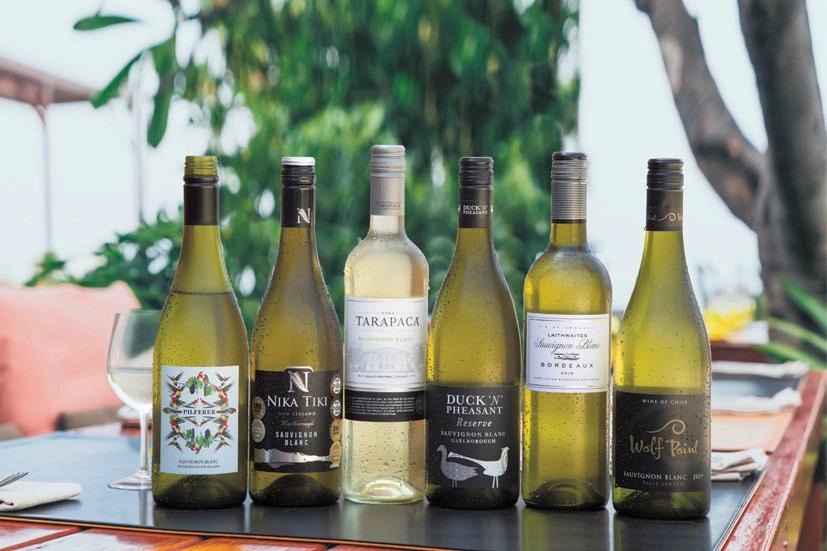

Can CBD relieve pain?

CBD WITH VITAMIN D ALSO AVAILABLE

Imagine a product that has the potential to bring a natural alternative to pain killers or help with your general wellbeing.
62-year-old John Bergl suffers from chronic osteoarthritis pain . He used to take eight or nine codeine tablets a day in an attempt to manage his pain, then he started taking Goodbody Botanicals Max 15% Peppermint CBD Oil drops. In his words:
After 3 days I stopped taking Codeine and Tramadol which I had relied on for a few nights a week for unbroken sleep. In the six months since I am not pain free, but my pain levels are down by 80% having only taken two lots of painkillers. I get to sleep a lot quicker too.
JOHN BERGLQuote R E A D E R 3 0 to get 30% off first purchase.
*Not in conjunction with any other offer. Offer ends 5th December 2020. On first purchase only.
Features
16 IT’S A MANN’S WORLD
Olly Mann reveals why he’s so embarrassed to discuss his recent foot injury
ENTERTAINMENT
20 INTERVIEW: BRIAN COX
The Scottish actor on ageing, family and a saucy incident with Princess Margaret
28 “I REMEMBER”: BILLY OCEAN
The iconic R&B musician looks back on his upbringing in Trinidad and Tobago and later career HEALTH
38 OPIOID CRISIS
Can you become addicted to the painkillers prescribed by your doctor? We chat to the people who have
INSPIRE
56 STATE OF SURVEILLANCE
Chris Menon ponders how much the government really knows about us
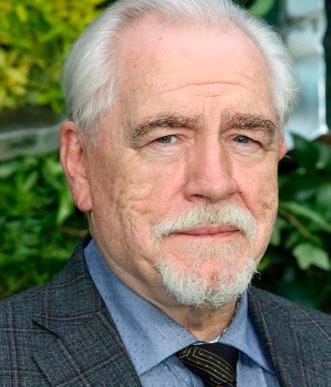

64 MY BRITAIN: BATH
Fall in love with the the feelgood, vibrant spa city of Bath
74 THE TROUBLES
As the media commemorates the 50th anniversary of the Troubles, Adam McGibbon wonders if it’s keeping old wounds open
82 HAPPY ACCIDENTS
From a coconut that saved JFK’s life to a dog that helped to discover Velcro






Making it count
After spending far too much time on apps and social media over the last few years, Gemma decided it was time for a change.
“I’d started to get really frustrated with how I was spending my spare time”, said Gemma, 54 from London. “One day, I realised I’d checked my phone over 100 times. Something had to give.”
“So, I deleted my social media apps from my phone and made a promise to myself to do something more positive with my time.”
At first, it wasn’t easy for Gemma to find things to do.
“I’m embarrassed to admit that I’d stopped reading as much over the last couple of years. But, then a friend recommended Readly to me. I’d always loved reading magazines and thought it was time to give them a go again.
The selection is amazing: food, fitness, lifestyle, culture, crafts and

hobbies are all covered. I’ve been using Readly in the evenings to relax instead of watching TV. I’ve also found it great for inspiration and ideas for new recipes. We’ve been doing some re-decorating, so the interior design section has been really helpful. Having so many past issues to browse through is just fantastic. I can’t think how much I would’ve had to spend to get all that content. If you read more than a couple of magazines, you’ll be saving money each month.
My husband loves the car, sport and business magazines. And we cuddle up and do the puzzles and crosswords together now as well!
As it’s a family membership, I’ve shared my subscription with my daughter who has started using it. She’s a teacher and loves getting inspiration from the kids news, science and history magazines.”
To find out more about Readly, and to try 1 month for free, please go to www.readly.com/digest
SENIOR EDITORS Anna Walker, Eva Mackevic
EDITORIAL ASSISTANT Jessica Lone Summers
ART DIRECTOR Richard Cooke
ADVERTISING Jigs Pankhania
MARKETING Sarah Hughes
HEAD OF FINANCE Santwana Singh
FINANCE MANAGER Irving Efren
MANAGING DIRECTOR Julie Leach
CHAIRMAN Gary Hopkins
subscriber enquiries, please
WE PAY...
£50 for the star letter and £30 for regular letters.
Email readersletters@readers digest.co.uk or go to readers digest.co.uk/contact-us
WE ALSO PAY...
£30 for the true stories, anecdotes, jokes in Laugh! and You Couldn’t Make It Up…, and contributions to end-ofarticle fillers and My Great Escape.
Email excerpts@readersdigest.co.uk or go to readersdigest.co.uk/contact-us
SORRY!
We cannot acknowledge or return unpublished items or unsolicited article-length manuscripts. Do not send SAEs. Article-length stories, poetry and cartoons are not requested.
TRUSTED MEDIA BRANDS INC (USA)
President and Chief Executive Officer
Bonnie Kintzer
Editor-in-Chief, International Magazines
Raimo Moysa
number below
CUSTOMER SERVICES
Contact Customer Services for renewals, gifts, address changes, payments, account information and all other enquiries. Call 0330 333 2220* or email customer_service@readersdigest.co.uk
TALKING MAGAZINES
Reader’s Digest is also available in audio and accessible etext editions from RNIB Newsagent, for blind and partially sighted readers. Call the RNIB Helpline on 0303 123 9999 or visit rnib.org.uk/newsagent
SUBSCRIPTIONS
Annual subscriptions are available to be delivered monthly direct to your door. For our latest offers please visit readersdigest.co.uk/subscribe Or telephone us today on 01778 392461
Gift subscriptions also available. UK rates may vary. Overseas rates: Republic of Ireland €50, Rest of the World €60.
Paul’s walking no longer an uphill battle thanks to TURMERIC+
WALKING IS ONE of the most beneficial forms of exercise, and also one of the most underestimated in terms of well-being. It’s a great way to reach the recommended level of physical activity needed to stay healthy without the toll to joints, ligaments and muscles that more demanding sports exact.
When taking longer walks however, some of us can experience skeletal and muscular discomfort.
Paul Goddard, 62, a Nordic Walking instructor from Saffron Walden in Essex, swears by a product called Turmeric+ as an effective means of keeping him active.
“Soon after taking it I experienced that
“I decided to become a Nordic Walking instructor in 2009. I now walk forty to fifty miles a week. Two years’ ago I had to have knee surgery and was advised that I could experience some discomfort in my knee for a while. Although the surgery was successful, I experienced a lot of discomfort and felt very apprehensive about my future.
Paul continues: “This wasn’t something I wanted to live with as I’m walking every day, so I started doing some research. I learned that turmeric could be helpful and bought supplements … and then stumbled upon Turmeric+”
Curcumin, the active ingredient in turmeric, is difficult for the body
to absorb, Some turmeric products offer high levels of curcumin but unless this is easily absorbed by the body, the higher amounts make little difference.
The need for easy absorption is what led the scientists at FutureYou Cambridge to create Turmeric+ using the patented ‘Curcuma Phospholipid Complex’ formulation. It’s thirty times more absorbable than standard turmeric and contains vitamin C, which contributes to normal collagen formation for the normal function of cartilage.
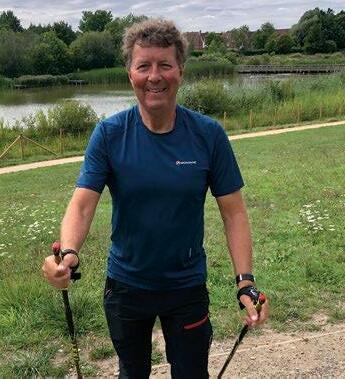
“Soon after taking it I experienced that ‘light-bulb’ moment - I realised my knees felt like they used to. I take Turmeric+ religiously now. I walk around two hundred miles a month and even my customers have remarked on my mobility.
“Walking is great for fitness as well as your mental health. Being able to walk easily has made a huge difference to my life and I feel fitter now than I did twenty years ago.”
Adam Cleevely, CEO of FutureYou Cambridge comments; “We want to support more people to get active and we think Turmeric+ can play an important role in that journey. We have tens of thousands of happy Turmeric+ subscribers who regularly tell us about their positive stories, just like Paul.”

In This Issue…

Our strange new COVID reality has brought with it, among myriad trials and tragedies, a few much-welcomed glimmers of hope and positive change. One of those is a renewed appreciation for the humble staycation. It wasn’t so long ago after all, that foreign trips were considered once-in-a-lifetime opportunities, rather than a yearly diary staple. On p64 we pay a visit to the beautiful spa city of Bath, and meet two residents who fell in love with the city for entirely different reasons.
Meanwhile on p98, one of our readers reveals the secrets of Whitby, the seaside town that provided author Bram Stoker with the backdrop for Dracula. If that’s not perfect Halloween-getaway inspiration, I don’t know what is!
October is here, which means Halloween is finally upon us again. It might feel a bit different this year though. Instead of bobbing for apples with strangers, a lot of us might be spending the night at home with more familiar frights.

To get you started, we’ve got an issue full of real-world horror stories: from malfeasant doctors prescribing addictive drugs on p38 to Big Brother Google secretly watching everything you do on p56, these stories are bound to send a shiver down your spine.
And if all that feels just a bit too familiar, just curl up with a copy of Shirley Jackson’s The Lottery, or watch her exquisitely haunting biopic (p118) and stay safe from the real horrors lurking among us.
Anna Eva
FOLLOW US
Over To You
LETTERS ON THE August ISSUE
We pay £50 for Letter of the Month and £30 for all others
LETTER OF THE MONTH
I was so pleased to see in the August Digest not only that My United Kingdom was about Belfast but also the article about the North Antrim Coast as well.

Two years ago I went on a coach trip to Belfast staying just outside the city in a hotel that was run by the friendliest staff. I fell in love with the City Hall and visited twice, not only for the wonderful café, but for the fascinating exhibitions, marvel at the Hall itself and sit in the grounds looking at the Titanic memorial. As a collector of all things Titanic, the associations with Belfast was a must for me. The Titanic Experience is so full of facts and things to do, we didn’t see the half of it. And we did a tour of the coast down to the Giants Causeway, stopping at the Bushmills Distillery on the way.
The only complaint I had was there were so many people at the Causeway that you could not truly appreciate this marvellous site. The whole coast drive along with its spectacular scenery was delightful. Yes they refer to the Troubles during the tour of Belfast—it is a big part of Northern Ireland’s history after all—but you cannot find a friendlier place, no wonder they are proud of their city.
MELANIE M BURGESS, WalesMEMORY LANE
I thoroughly enjoyed the article on Belfast. It brought back childhood memories of visiting my grandparents every year. As soon as school finished for the summer, my sister and I excitedly sailed across on the Ardrossan to Belfast ferry eagerly anticipating the fun we would have for eight weeks before returning to school. I remember the civilian checks, road blocks and bomb scares in the shops, but mostly I remember the friendly people, the welcome back by shopkeepers we knew, and even strangers saying hello. Visiting a few years ago in my fifties, my aunt commented, “I always thought you would come back to live here”, and under different circumstances I definitely would have. I love Northern Ireland and it’s people and always will.
GERALDINE SYSON, Glasgow
HARD TIMES

“Has Coronavirus Left More or Less Money?” struck a chord with me. lockdown brought together, despite being forced apart, the pandemic has impacted us all differently especially financially and although it’s gratifying to know there are other people like me whose personal debt has also spiralled out of control it doesn’t make it any easier. I am in mortgage arrears for the first time in my life. I owe my parents money. My credit card is maxed out, and my direct debits have bounced.
Right before lockdown, I’d just started a new job supply teaching in a school and thankfully I have not been furloughed. Although I am told they might need me in September, there is no guarantee. So, although I am not alone in such dire straits; it feels very lonely. But thank you for all the good advice contained in this article. I realise I have some options, and that’s reassuring.
RYAN GEORGE, DenbighshireLOSING LANGUAGES
I was saddened by your article “Preserving Lost Languages”. It’s dreadful to think that hundreds languages are teetering on the brink of extinction, and we may lose more than just words if we allow them to die out. Some people argue that language loss, like species loss, is simply a fact of life on an ever-evolving planet. But we spend large amounts of money protecting species and biodiversity, so shouldn’t the one thing that makes us singularly human be similarly nourished and protected? I for one think it does matter when a seemingly obscure language spoken by a few people in one isolated corner of the world goes out of existence. We will lose ancient knowledge if we lose languages.
AMELIA BARNES, Denbighshire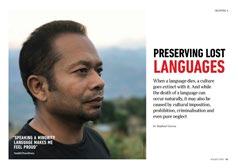
ACHIEVE YOUR FINANCIAL GOALS WITH A LIFETIME MORTGAGE
It is no secret that house prices have ballooned over the years, and for many of us is the most valuable thing that we own.

However, the way that over-55 homeowners view their home is changing. Equity release, in particular Lifetime Mortgages, is allowing their home to pay them back for years of hard work. The variety of plans and features available makes it easy to access your equity and use it for large or small financial goals. Many of those releasing equity are choosing to do so with financial stability in mind. The other main reasons our customers choose to release equity is to clear an existing mortgage, make home improvements or fund care costs; when you release equity, the cash is tax-free and it’s entirely up to you how you choose to spend it.
Releasing equity can give you the necessary funds to improve your quality of living for yourself and your loved ones. Unlike traditional mortgages you are not obligated to make payments, as the

entirety of the mortgage, plus interest, is most commonly paid back through the sale of the home after death or entering longterm residential care.
On top of this, there are multiple customer-focused safeguards which can help you to support family now and yourself throughout your retirement. For instance, all the Lifetime Mortgage products recommended by Reader’s Digest Equity Release come with a no-negativeequity guarantee which ensures you can never owe more than the value of your home and cannot pass on any Lifetime Mortgage debt. You are also not stuck in your current property if you decide to take
out a Lifetime Mortgage, as some plans are portable, provided the home you move to also fits the lender’s criteria.
Making the most of all of the features on offer is important and that is why we are making it easy for you to have access to specialist equity release advice. Your local adviser can help you to decide if a Lifetime Mortgage is right for you, as well as help you to understand the impact releasing equity can have on your estate’s value and entitlement to means-tested benefits. Our advisers will provide you with a personalised illustration and will take you through the features and risks with consideration of your personal situation. n



…DIFFERENTLY
In October, the more senior students of the UK’s 600-plus-year-old St Andrews University like to welcome new pupils—with a huge foam party! The newbies are hosed down with shaving cream by their elders in a purely friendly initiation ritual. At the end of the process, the younger classes are accepted as full-fledged university-family members. Previously the freshmen would “thank” the older students with a handful of raisins, thus the modern foamy welcoming ceremony is still known as the “Raisin Weekend”. Thanks to the COVID pandemic, this year’s event will more than likely be postponed or celebrated on a smaller scale—sadly without the foam!
 Photo: © J i M r Y ce / a la MY Stock
Photo: © J i M r Y ce / a la MY Stock
Accidents Will Happen
This month, a decidedly unspectacular injury leaves Olly Mann frustrated at the distinct lack of a story to tell
I’ve hurt my foot. I’m limping and using a crutch. If you met me, you’d probably express sympathy and fetch me a cold compress. But, if you then asked me how it happened, you’d find yourself wondering if I’d made the whole thing up, like those guys who fake an illness to claim insurance money and retire to Cuba.
Because the story behind the injury is underwhelming. Not just underwhelming: almost nonexistent. Blink and you’d miss it. I was there, and I did miss it.
It all started when I interviewed a

Olly Mann presents Four Thought for BBC Radio 4, and the award-winning podcasts The Modern Mann and Answer Me This!
biking journalist called Lois Pryce for my Radio 4 podcast, Four Thought. She was telling me how we Brits have a very peculiar relationship with cycling. In places like Holland and Germany, she said, it’s quite usual to get on a bike, wearing your normal day-to-day clothes, and efficiently transport yourself from A to B. You don’t need the luminescent trousers, or the streamlined sports helmet, or any of the specialist gear so beloved by the "Middle-Aged Men in Lycra" each Sunday afternoon. Just get on your bike, and give it a go!
Inspired by our conversation, I immediately got to work restoring my bicycle—gifted to me for my 16th birthday, but unridden ever since I was given driving lessons for my 17th. It was covered in cobwebs, and a little low for me, but, I could see, with some air pumped in the
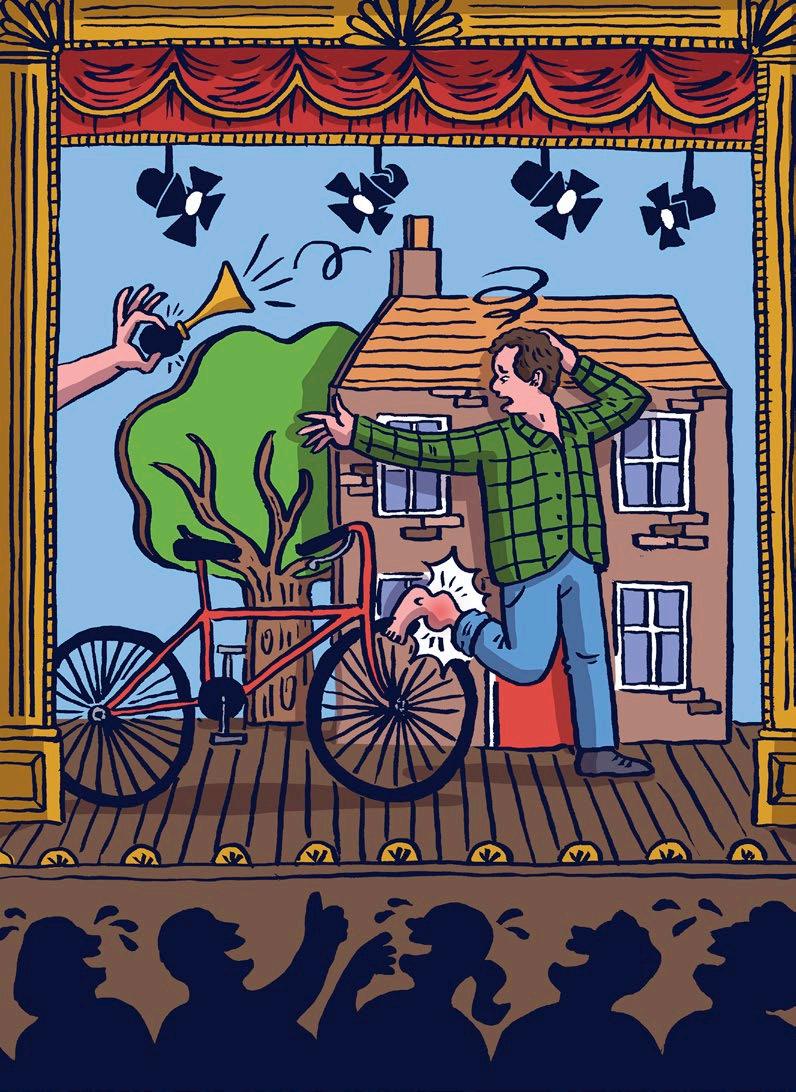
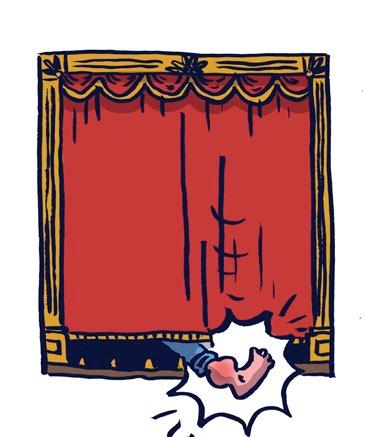
tyres, it could be revived. So, off I went to buy a £30 bike pump (no point getting one of the cheap ones, I thought, I’m a CYCLIST now!) and, after 20 minutes of prodding and poking, I rendered it roadworthy. I was proud of myself. I tested it. I was a little wobbly—part tummy-flab, part inexperience— but I managed to successfully cycle down the footpath and back to my house. I rode the bike for— literally—four minutes, then put it away in the shed. It worked. It was fun. I was happy.
The next day, I couldn’t walk. Putting my foot to the floor was excruciating. I tried elevation, ibuprofen and ice packs; then called my doctor, who asked me to send her a photo. I now had a big red bulbous bit on the edge of my foot, which was throbbing. She told me I had tendonitis, caused by doing exercise without properly warming up.
But I hadn’t done any exercise! I’d just tested my bike for four minutes, and it hadn’t hurt. True, I had been wearing Birkenstocks—comfortable sandals, though not exactly activewear but that’s because Lois had so
specifically said that I didn’t need to buy special clothes. I was indignant. For a week since, I’ve been limping around; suffering a sports injury, with the added indignity that no actual sport had even been attempted. It’s somehow even more embarrassing than when I fell over "skiing" whilst waiting for my first ever skiing lesson to start, thereby dislocating my shoulder. That day, at least, I’d been intending to do some physical activity.
If only there was a decent anecdote to account for my grimacing and gurning, I could more openly explain it to my friends. If only the incident had been more dramatic. If I’d heard an audible snap as my muscle tissue pinged against the pedal, then perhaps my brain could process the accident as a trauma. But it was so low-key, so anonymous, so unspectacular, that it’s as if it didn’t happen. I’m the Walter Mitty of cycling.
At least I can console myself that this isn’t the most absurdly unspectacular injury I’ve ever contracted. That would be the one I suffered in 2006, when I was
producing a play at the Edinburgh Fringe festival. Ten copies of the script were required for the cast and crew, so I duly headed down to Staples and the 2p-per-page copy machine. I spread ten copies of the title page across the floor in front of me, and, as each subsequent page of the script was spat out by the machine, I lunged down to add it to one of the ten respective piles. By page 32—thus 320 squats to the floor—I felt an ache at the back of my knee. By page 50—500 grand thrusts completed in all—I was finding it hard to walk.
The next day, as now, I couldn’t walk at all. Ladies and gentlemen, I had contracted a photocopying
injury. At least my current nonbiking fracture involves the presence of exercise apparatus. A photocopier is so far removed from being seen as sports equipment that it could even be said to symbolise the problematically sedentary existence of the modern-day citizen.
Our culture is, quite rightly, attuned to assist those suffering from really serious illnesses—the cancers, the fevers, the organ failures—with the kindness and charity that they deserve.
But please, do spare a moment's thought for those of us who are clumsy, foolish and accident-prone, too. And don’t ever get on a bike in your Birkenstocks. n
Filthy Rich
The reason Tudor monarchs moved their courts constantly wasn't down to choice, but because their filthy residences rendered long-term habitation extremely undesirable. Within days of a royal party settling in a palace, a stink would set in from poorly discarded food, animal waste, vermin, unwashed bodies and clothing, and human excrement. Hampton Court in particular, was regularly evacuated in order to be cleansed of the mounds of human waste that would build up, meaning that no royal party could stay there for too long.
And the problem wasn't limited to British royals. A 1675 report on Paris's Louvre Palace declared that: “On the grand staircases” and “behind the doors and almost everywhere one sees there a mass of excrement, one smells a thousand unbearable stenches caused by calls of nature which everyone goes to do there every day.” Delightful!
Source: history.com/news/royal-palace-life-hygiene-henry-viii

Brian Cox:
The Swearing Raconteur
by James MottramThe legend of stage and screen reveals his thoughts on political correctness, longevity and a scandalous moment with Princess Margaret
Brian Cox is back.
Literally. The acclaimed actor has just flown over from the States and spent the last two weeks in London, “socially distancing myself”, before taking a trip back to his native Scotland to visit his 90 year-old sister. She lives in a care home just a few minutes from his daughter Margaret’s cottage on the River Tay, near Aberfeldy.
“I was supposed to try and get to see her in April but of course with the lockdown I never did.”
Cox, who turned 74 in June, had COVID himself at the turn of the year, despite sheltering in his home in upstate New York, which he shares with his wife, actress Nicole Ansari. “I have the antibodies, which was a
mystery to me,” he says. “I would’ve said I was almost asymptomatic, but I wasn’t. I had a bad sneezing fit in December. And my doctor said that’s when I had it. It’s clearly been around a lot longer than people have let on.”
Thankfully, Cox has made a full recovery—though it’s not been straightforward. “I’ve been living with two teenage boys in lockdown for the last five months. Not an easy experience!” He and Ansari’s two sons, Orson and Torin, have been struggling like anyone else. “My youngest son. He’s very tall. He’s six foot three, and he’s going through all kinds of hormonal shifts, as teenage boys go through and to do online learning… he misses the human contact.”
 Brian Cox after winning a Golden Globe for his performance in Succession
Brian Cox after winning a Golden Globe for his performance in Succession
Ironically, this has all coincided with a hugely fruitful period in Cox’s working life. Next year he celebrates the 60th anniversary of a stage and screen career—he started in Dundee rep when he was 15—that has seen him do everything from King Lear at the RSC to the original Hannibal Lecter (spelled “Lecktor”) in serial killer classic Manhunter. And he’ll do so with one of the best roles of his life, his Golden Globe-winning turn as media mogul Logan Roy in HBO must-see drama Succession.
Like a toxic mix of Rupert Murdoch and Donald Trump, Cox’s foul-mouthed Roy holds a nightmarish sway over his power-hungry family, each desperate to take control of his ailing media empire.
squabbling over sausages. So powerful, so humiliating, it probably single-handedly won Cox his Globe (he’d previously been nominated for playing Hermann Goring in TV mini-series, Nuremberg back in 2000, which also snagged him an Emmy).
Frustratingly for fans, the third season was put on hold due to lockdown. “We were supposed to start on April 20. We never started. I mean we’re still waiting. We’ll hopefully go at the end of the year or the beginning of the next.”
“The only thing to do with political correctness is to fly in the face of it”
“I love it. It’s a great role,” he beams, “and it’s going on through so many shifts.” Originally intended to be just one season—Roy has a stroke early doors—his continuation helped the show retain its venom. “By the time you get to ‘boar on the floor’, you have a glimpse of the demonic.”
Already cemented in TV history, the “boar in the floor” scene, from the third episode of season two, saw Roy force some of his family members to play a demeaning game—grunting like pigs and
If anyone can sweeten that prolonged wait, Cox can. “I’ll tell you this much,” he says, conspiratorially.
“I know what’s happening. I can’t tell you what’s happening. But I’ll tell you that it’s even better than season two.” This is Cox all over—a fabulously gifted raconteur who would, undoubtedly, be glorious company over a malt whisky or two. Nobody tells stories like Cox. Nobody swears like him either (as anyone who saw his glorious cameo as screenwriting guru Robert McKee in Adaptation will know). When I met him years ago, for Hollywood comedy The Ringer, he told me: “Oh, I love flying in the face of political correctness. It’s the only thing you do with
“Call something what it is as opposed to something that you think it should be”
political correctness—fly in the face of it.”
When we start talking about his new film, The Bay of Silence, it becomes clear this aspect of his personality hasn’t changed. A taut and involving psychological thriller, based on the 1986 book by English novelist Lisa St Aubin de Terán, whom he’d spent time with, Cox plays Milton, a well-to-go gallery owner and stepfather to Olga Kurylenko’s pregnant photographer, whose tumble from a balcony at the beginning of the film triggers a psychotic episode.
Much of the story is seen through the eyes of her husband Will (Claes Bang), who is left to seek out his wife after she disappears, but Cox brings his usual panache to the role of a man facing a changing world. “It’s not the world that was,” he says. “The
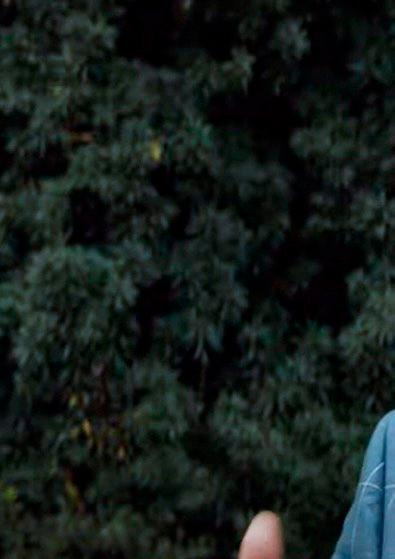
TheBayofSilence
aesthetic of the world has changed. He would be a victim of #MeToo, but also of the cancel culture.” He chuckles to himself. “I seem to be playing a lot of white dinosaurs.”
We then return to this idea of political correctness, and the subject of Harry Potter author, JK Rowling, who recently came under fire for tweeting opinions about the transgender community. In particular, she took issue with an article that discussed “people who menstruate”, objecting to the fact the story did not use the word “women”. “I know and love trans people,” she later wrote, “but erasing the concept of sex removes the ability of many to
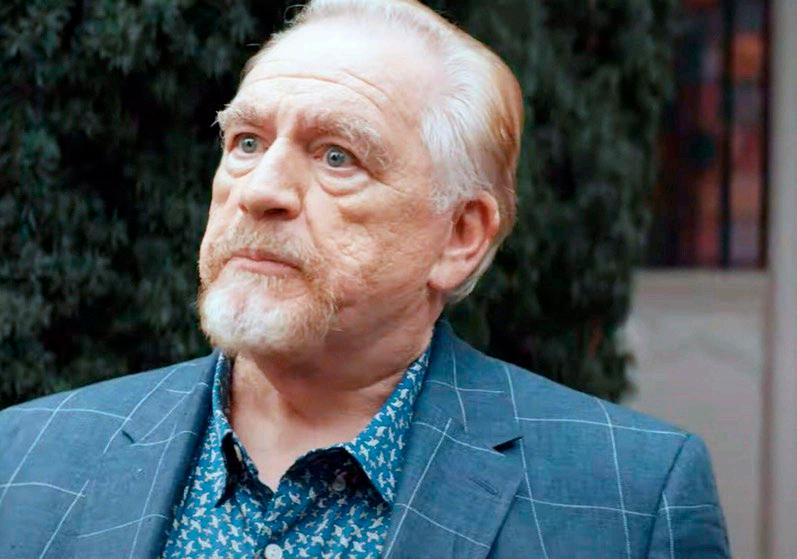
meaningfully discuss their lives.”
Much of this passed Cox by, initially. “I was asking my son because I’d been away when this JK Rowling thing had been going on. I kept saying, ‘So what happened?’ He said, ‘Well, she believes women menstruate.’ That’s what they do, don’t they?” He belly laughs. “He said, ‘Well, people don’t like that.’ And you go, ‘Oh, for Christ’s sake!’ Call something what it is, as opposed to something that you think it should be. And it is—it’s the cancel culture. I keep well away from it.”
He’s marvellously indiscreet when he wants to be. He recently revealed
that he’d had an “encounter,” shall we say, with Princess Margaret, when he was performing in a 1969 Royal Court production of In Celebration, alongside Alan Bates and James Bolam. Her Royal Highness came into the dressing room “and started to run her fingers down the inside of my shirt”. Was this true? “Oh yeah...well, in 60 years, things like that happen! And it did happen! She unbuttoned my shirt, on my birthday!”
He was 23 at the time and it was just a few years after he’d graduated from Lamda. I suggest that Netflix’s TV show The Crown should’ve featured this moment. “Yeah, well, they didn’t know about it in The

 (Top); Manhunter (Below); Zodiac
(Top); Manhunter (Below); Zodiac
Crown! They didn’t know about it. Unfortunately, a lot of people [who were there] are dead. But James Bolam, who is still alive and thriving—he was there and he was the one that was making [surprised] noises while she was doing it. She couldn’t hear him!”
Being graced by royalty must likely have been shocking for the young Cox—he was 24 at the time. The youngest of five, he came from a working-class Dundee background. His mother Mary worked as a spinner; his father Charles was a police officer and, sadly, passed away from cancer when Cox was eight. His mother later had a nervous breakdown and, from the age of ten, he was largely looked after by his sisters. Cox left school in his mid-teens, and became a stage manager.
I worked and followed my instincts.”
When he went to Hollywood, on the back of roles on Rob Roy and Braveheart in the mid-Nineties, he found acclaimed filmmakers queuing up. Among them: Wes Anderson (Rushmore) Spike Jonze (the aforementioned Adaptation), Spike Lee (25th Hour) and David Fincher (Zodiac). There were also key roles in the Jason Bourne franchise and X-Men 2—still the best film in the superhero series. It’s a collection of films anyone would be proud to have on their CV.
“Time is such a funny thing—it all seems to be very short”
Since then, his longevity in the business is remarkable. “Well, I think part of it is never standing still. I’ve learned to be a moving target. There have been occasions where I’ve been shot up because I stood still! But I bobbed and weaved. I went to the US when I was 50, because I always wanted to do movies, but I’d had a theatre career here. I had a good career when I was young. And then
“Somebody once actually said to me, ‘It’s the long haul, Brian’ and they were right, and I thought about that,” he muses. “I thought, Yeah, I still want to do this when I’m 70. So I am and I’m still doing it! It’s worked out the way I hoped it would work out. So I actually feel quite grateful for that. But it’s also been quite conscious on my part. Time is such a funny thing—it all seems to be very short. Especially during lockdown. I get up in the morning, and I go to bed just after I’ve got up. What happened?” That’s something we can probably all relate to right now. n
The Bay of Silence is available on digital and DVD from September 28



I REMEMBER… Billy Ocean
Coming to fame in the 1970s, Billy Ocean has sold more than 30 million records. Now aged 70, he looks back on moving from the Caribbean to England, getting sacked from Savile Row and performing at Live Aid
…I REALISED I HAD SOMETHING CALLED “A VOICE” from around the age of three or four, and my mum always encouraged me to sing. She was a domestic and would sometimes bring home work, like ironing, and when she was doing it she’d ask me to sing to her to keep her company. I remember many a Saturday night when that happened. Dad was a musician, which also inspired me as a youngster. He’d compose calypsos on his guitar and he was like the village entertainer.
…MY FATHER DID ALL SORTS OF JOBS. I grew up in Trinidad and Tobago in the Caribbean, until we moved to England when I was ten, and there wasn’t an organised system of work. You either worked in the oil field, which was the most responsible job there was, or you did whatever you could to feed your family. Back then people were dab hands at everything—such as gardening, fishing, making utensils out of discarded tins—and my father was one of them. That’s really the
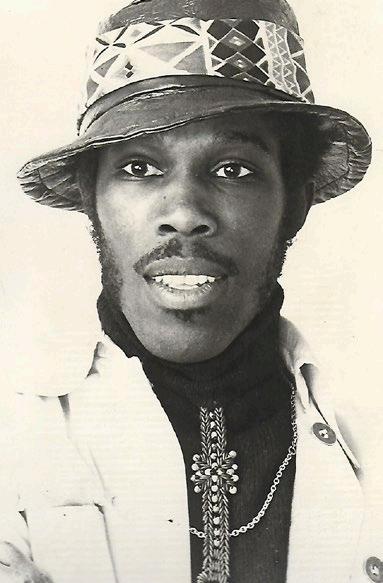
main reason he emigrated to England as part of the Windrush movement, eventually bringing us over with him in 1960.
…ARRIVING IN ALDGATE EAST WAS A TOTAL CULTURE SHOCK.
I’d come from living on the border of a cocoa and coffee plantation, then suddenly there were all these buildings and streets and cars. It was all very strange to me but as a child, you adapt very quickly, whereas if I’d been a grown-up
I’d probably have fled back to the Caribbean!
…SCHOOL WAS A BIG ADJUSTMENT. There wasn’t much contact with white people in Trinidad and Tobago, except for those my mum worked for, so mixing with white kids was very strange to start with. Again, the thing that helped me out a lot was music because I helped organise concerts and because I’m a pretty friendly person anyway, I didn’t have any problems, but initially I was very cautious. I wasn’t very academic. I found mathematics very difficult; logarithms and square roots and that kind of thing baffled me, although I learned my times tables and my alphabet. The teachers never really explained anything properly and they concentrated on the brighter kids. There were some kids who were so bright it made me wonder how the Lord made both of us.
…I FIRST MET MY WIFE, JUDY, WHEN I WAS A BOY. She went to Tower Hamlets girls’ school and I went to Stepney Green boys’ school, and we used to pass each other in the street in the morning and evening. A friendship blossomed, then after we left school we started going out, we’ve been together ever since and we now have three kids and three grandkids. Becoming a dad made me more responsible because
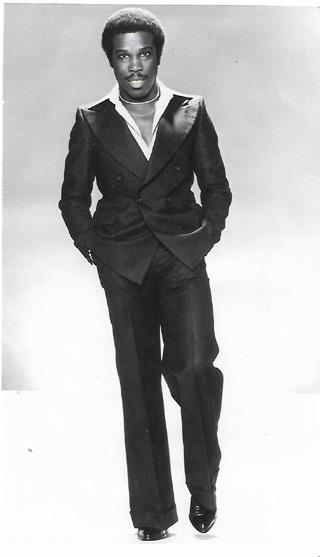

you have mouths to feed. You have to put food on the table and I tried to make sure my kids got a good education because I didn’t have the opportunity to have one myself. My youngest daughter, Rachel, is now a teacher and Cherie, who always loved music, is one of my backing singers, while Anthony is a fitness instructor.
…BY AGE 13 I REALISED MY FUTURE LAY IN SINGING so the first thing I did when I left school was audition for a band. I sang in
London clubs and everything just stemmed from there. Back then the music industry was basically run by independent producers, who would make a demo, then go looking for someone to put a decent voice to it. Fortunately I was one of the people they picked up on. It was like my apprenticeship because through that process I learned to write songs and suddenly I was doing something that really excited me.
…I QUALIFIED AS A TAILOR AND WORKED IN SAVILE ROW TO SUPPORT MYSELF but I got the sack because of music. There was a BBC radio show called Round Table and they played one of my songs, so I told everybody on the floor about it, the machines were switched off so they
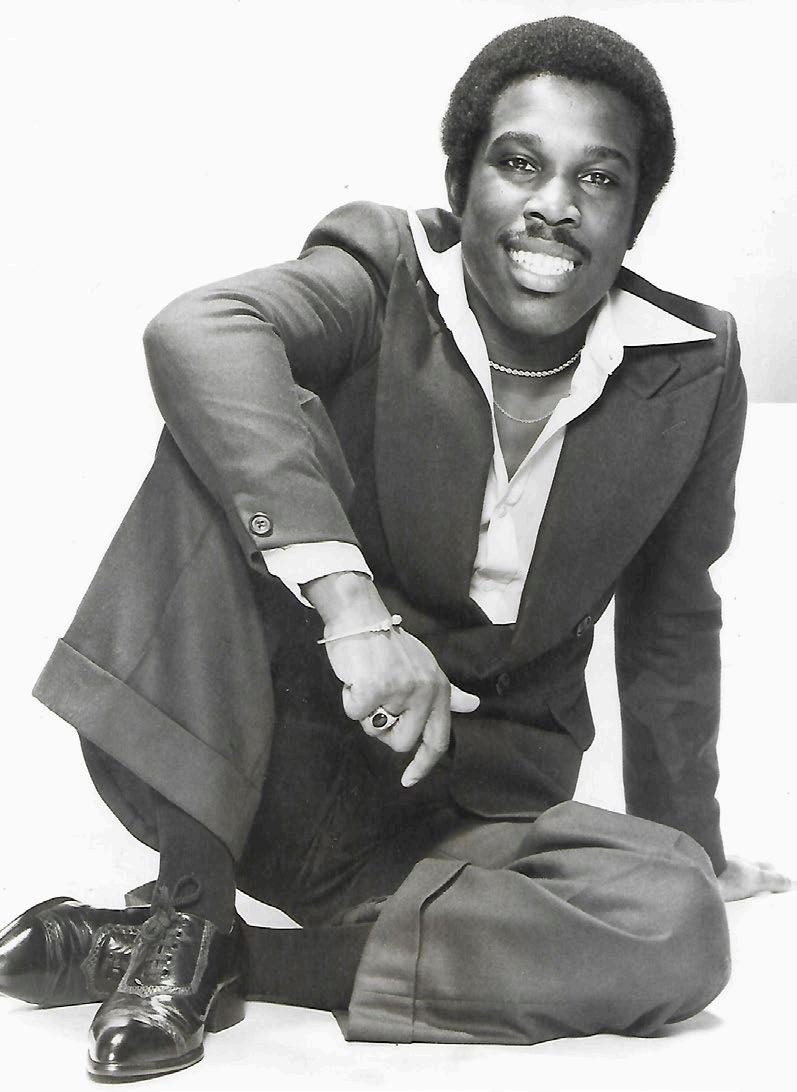

could listen to it. I got a polite round of applause, then the next Friday I got the sack because of it. After that I worked on the assembly line at the Ford factory before quitting to pursue a full-time music career.
…CHANGING
MY NAME TO BILLY OCEAN WAS A STRATEGIC MOVE. Working with producers, they’d write the songs, feed you, clothe you and give you a name, but if they fell out with you—no matter how successful you were—you couldn’t keep the name. My birth name is Leslie Sebastian Charles and I decided to give myself a new name that no-one could take from me. Ocean came from the name of the football team in my home town of Fyzabad, who were called Oceans 11, then it was just a case of putting a Christian name to it and I settled on Billy.
…I
WROTE LOVE REALLY HURTS WITHOUT YOU ON AN OLD PIANO
I’D BOUGHT FOR £23. I lived with my parents in a council flat and this mini upright piano fitted beautifully into an alcove. I taught myself how to play it, one day I started plonking away and the riff, melody and words just came to me. A producer I was working with helped me finish it, then the next thing I know I’m on Top of the Pops. I went back on the show five or six times and the song eventually made it to number two.
…DOING LIVE AID IN 1985 WAS AMAZING. Having had a number one hit in the States with “Caribbean Queen” the previous year, I was invited to perform at the Philadelphia concert. I was extremely nervous because I was on the same bill as people like Teddy Pendergrass and


Tina Turner and it was the biggest audience I’d ever sung to, but I got through it and, of course, raising money for famine relief was very important.
…MICHAEL DOUGLAS, KATHLEEN TURNER AND DANNY DE VITO flew over to make the video for “When the Going Gets Tough”. They’d done the sequel to Romancing the Stone, namely The Jewel of the Nile, and needed a song for it, which we only had a day and a half to write and I didn’t finish it until six o’clock in the morning. I sent it over, they liked it, then they turned up at Brixton Academy with the words and dance routine already memorised.
…MEETING STEVE WONDER WAS A REAL HIGHLIGHT. I met him in the US when we were planning to work together. The collaboration never happened in the end for various reasons but he’s such a lovely man. Our paths have crossed several times since and we always have a nice chat and send messages back and forth.
… MY PARENTS WERE SEPARATED by the time my father died from natural causes when he was 65. I’d gone looking for him and was told he was in hospital, but when I got there a couple of days later he’d died. That was very sad.
…WHEN MY MOTHER PASSED AWAY I WAS HEARTBROKEN. She was 69 or 70 and she died from cancer. It prompted me to take time out from my career and also to become a vegetarian because she died from stomach cancer and I wondered if eating a lot of meat—as was common in Caribbean culture— might have contributed to that. I also began reading the Bible she’d given me as a gift many years before, which helped me connect with my spirituality and gave me an anchor to grab onto and keep me going.
…RECEIVING A MOBO AWARD WAS A GREAT HONOUR. I was given the lifetime achievement award in 2010 and it was very special to me, as was being named a Companion of the
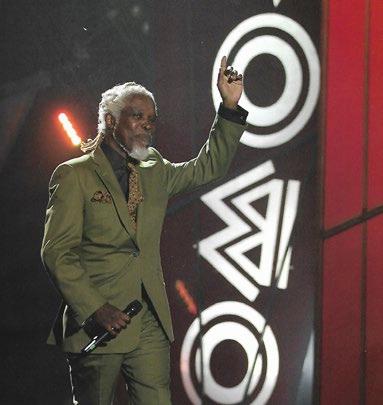
Liverpool Institute for Performing Arts the following year. It was presented to me by Paul McCartney and I grew up listening to The Beatles when I came to England, so meeting him was like Flipping heck! I cherish all my awards, although I used to hide them away in my manager’s office. For some strange reason I didn’t want my kids to see them because I didn’t want them to think I had a swollen head, nor did I want them to think that I no longer had to strive. When my manager passed away I moved all the awards into the house, although most of them are packed away under the piano rather than on show. n

As told to Simon Button
Billy Ocean’s new album One World is out on September 4. Tickets for his 2021 UK tour are on sale now through billyocean.com
A Hearty Mammal
A blue whale’s heart is the biggest on the planet, weighing 400 pounds. That’s the weight of about 35 gallon paint cans. By comparison, the heart of an African elephant, the largest land creature, weighs about 30 pounds. Interestingly, an elephant’s heart is five per cent of an elephant’s weight, but a blue whale’s heart is only one per cent—however the whale’s immense weight is supported by water. At 16 ounces, your heart is half a percent of your body weight.
Via
cshwhalingmuseum.orgThere were ups
You’ve made a mark
There were downs
You’ve lived
Perhaps more than you realise
Triumphs Failures
And children
And now grandchildren
It’s time to tell your story
Love, laughter, tears
The gift of a lifetime
LifeBook is the world’s leading autobiography service. Around the world more than 8000 people already enjoy owning the life story of someone they love. Each book is a unique piece of family treasure, custom-made and handcrafted, to be shared by generations to come. It’s time to tell your story.
Find out how by contacting us on 0800 999 2280 or visit lifebookuk.com

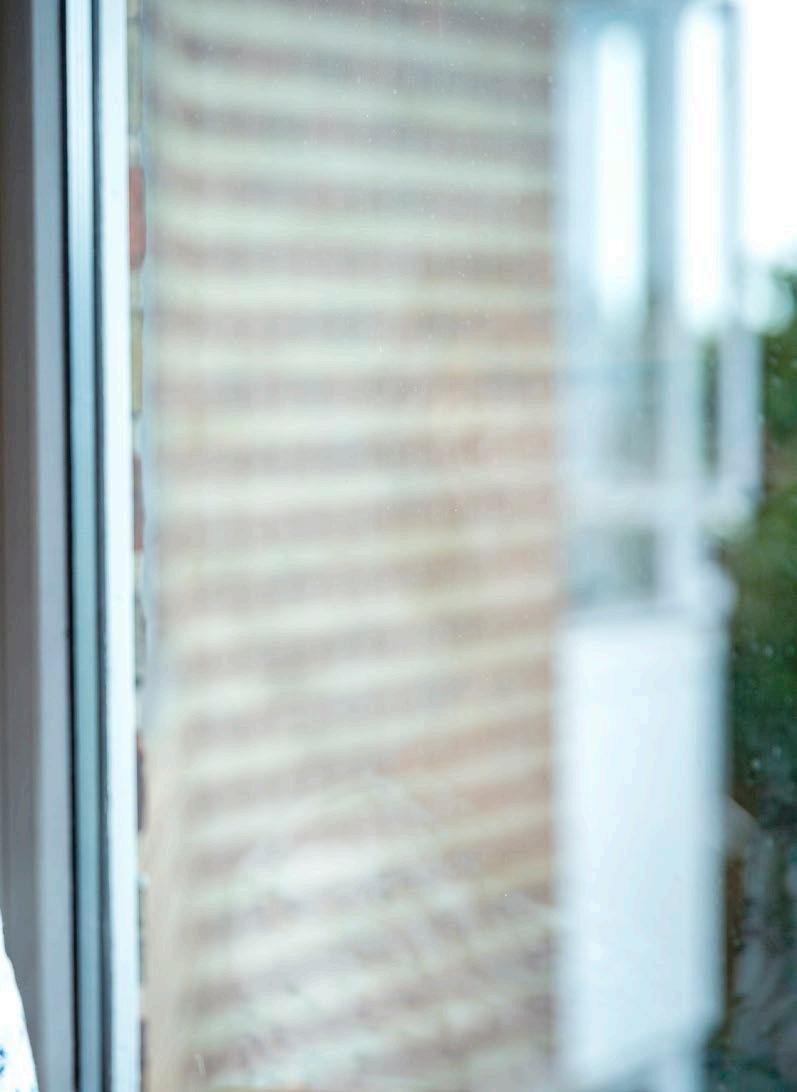
Did Told” as I Was “I Just
Like thousands across Europe, Dorte Søgaard became dependent on a doctor-prescribed drug by Lia
GraingerDorte Bjørgulf Søgaard had felt exhausted for years. The Danish mother of two was accustomed to being busy and stressed, but in 1999 her anxiety reached a tipping point.
She went to her family doctor. He told her she had a chemical imbalance, and prescribed paroxetine, an antidepressant.
“This is the best, scientifically proven treatment,” he said, explaining it could take a month to start working. Then he wrote a prescription for oxazepam, a medication from the benzodiazepine class of drugs, “to help your anxiety in the meantime.”
At home that night, Dorte held the pills in her hand.
She’d always declined medication for her moods, but this time her doctor had insisted. “It’s only temporary,” she told herself.
The benzodiazepine did help Dorte relax, but within weeks she needed more pills to achieve the same effect.
In the years that followed, Dorte’s doctor prescribed so many different combinations of antidepressants, benzodiazepines and sleeping pills that today she has difficulty recalling what she took. Her mind became a dull fog and her body ached. In 2007, Dorte took time off work and spent her days in bed. Two years later, she lost her job. After that, she barely left the house.
In November, 2009 Dorte’s husband and siblings, realising
she was completely dependent on medication, decided to send her to a treatment centre for alcoholics, which was the only option they could find at the time. The staff demanded she stop taking all medication at once. Every morning, shaking from withdrawal, Dorte stood and addressed a room full of patients.
“My name is Dorte and I’m a benzo addict,” she told the group. But she never believed the words she spoke.
“I’m not an addict,” she told herself silently. “I just did as I was told.”
“Most patients don't know the potential for dependence with these drugs”
Dorte’s story isn't unique. Doctors across Europe routinely give patients long-term prescriptions for powerful medications intended for very limited, short-term use. Researchers know that benzodiazepines, codeine (a mild opioid used to treat pain) and z-drugs (a newer class of sedatives used for insomnia) can create powerful dependence in users, sometimes after only a month of regular daily use.
“Most patients don’t know about the potential for dependence with these drugs,” says Professor Gerd
Glaeske PhD, a prescription drug expert at the University of Bremen. “Very often the doctor doesn’t even mention it.”
Pan-European data on these medications are scarce, yet Glaske, who has worked for decades in public health and drug health care analysis, estimates that about two percent of the population in industrialised nations is taking one of these medications—a percentage equal to more than ten million Europeans.
“This is a serious problem," says Professor Glaeske. “Once a patient has been taking these drugs for a few years, it’s incredibly hard to stop.”
“I trusted my doctor,” says Dorte. “I did as he said.”
Here are the three classes of widely prescribed drugs that can quickly induce dependence, side effects and withdrawal upon cessation.
Benzodiazepines
Xanax, Ativan, Valium. These are just a few of the brand names given to benzodiazepines. This class of tranquillisers increase chemicals in the brain that slow the nervous system and relieve anxiety. They entered the market in the 1960s and quickly became the world’s most popular sedatives. The guidelines for benzodiazepine treatment posted online by the European Monitoring Centre for Drugs and Drug Addiction
state that the drugs “should be used in the lowest dose and for the shortest time, maximum two to four weeks.”
Yet doctors continue to hand out long-term prescriptions. A 2015 German research paper estimates that up to 1.6 million German citizens may have long-term dependence on these drugs. A study of French benzodiazepine use found that 20 per cent of the country’s population had used the drug in 2010.
And if their legal source for the drug is no longer available, or the prescribed dosage no longer produces the desired effect, some patients may turn to illicit sources.
“The problem with the abuse of benzodiazepines in Europe is huge—much higher than the United States,” says Dr Jose Martinez-Raga, head of psychiatry at the University Hospital Doctor Peset in Valencia, Spain. He is a co-author of a 2016 study examining non-medical use of prescription drugs like benzodiazepines in five European countries—Denmark, Germany, UK, Spain and Sweden. The study found that an estimated six per cent of the collective population of the five countries—about 12.7 million people—had consumed a sedative like a benzodiazepine for nonmedical use in the previous year.
Once a patient has become physically dependent, they must continue to take the drug or suffer the effects of withdrawal. These can
include headache, dizziness, fatigue, muscle pain and hypersensitivity, as well as anxiety, depression and other mental health issues the drug may have initially been intended to treat.
The safest way to get off the medication is through an extremely gradual tapering program. Ideally this is supervised by experts in prescribed dependence, yet these resources are few and far between. Stopping abruptly, as Dorte did in the alcohol rehab centre, is never advised.
For Dorte, the turnaround came with the help of an online support group she found in 2011. By conversing with people who shared in her struggles, she learned how to “micro-taper” off benzodiazepine. It would take four and a half years.
Painkillers
It was 2014 and Lisa Peake was on a roll. At 43, the Londoner was the head of global employee relationships at one of the biggest accounting firms in the world.
On a clear February morning, Lisa headed out for a bike ride. She was pulling into an intersection when she was struck hard by a white van following too closely behind. Lisa sailed through the air, her head bouncing off the pavement as she landed.
It seemed she had been lucky; there were no internal injuries or breaks. But later that day she began
to experience excruciating neck pain that would change her life. She was prescribed painkillers: codeine four times a day with the option of Tramadol—another opioid painkiller—once a day.
At first the pills and dosage worked, but Lisa quickly found she needed a higher dose to achieve the same effect. Repeat visits to her doctor yielded a smorgasbord of prescriptions for a variety of painkillers, but the opioids codeine and Tramadol remained the main treatment. No one spoke to Lisa about the possibility of addiction to these drugs.
Within months, Lisa began waking in the night drenched in sweat and itchy all over. Her mind grew dull. One day she fell asleep in a board meeting. Shortly after, Lisa’s boss called her into his office and fired her.
“I don’t have an addictive personality,” says Lisa. “But when something is all you think about from the moment you wake up, you just take it.”
Codeine is most commonly used to treat mild to moderate pain. In 15 of the European Union’s 27 member states, and in the UK, it is available over the counter in pharmacies. Taken in tablet form, the drug is metabolised into morphine in the liver. Everyone metabolises differently, so a safe dosage can vary greatly from one person to the next. Tolerance can develop with just a few
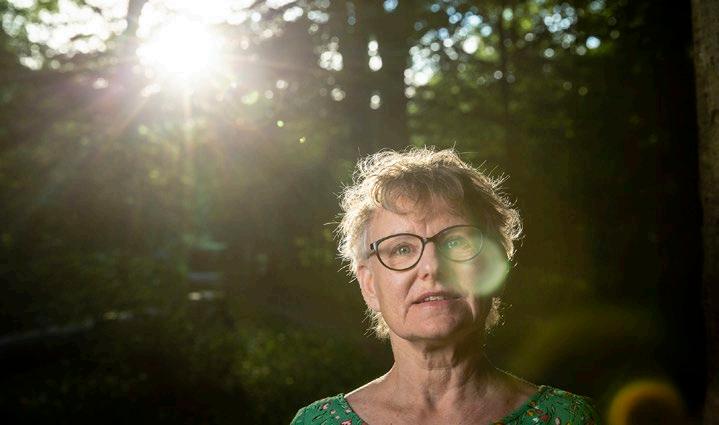
weeks of regular daily use, so greater doses are soon required.
“No one starts out thinking, I’m going to take codeine on and off for the next five years until I can barely function,” says Dr Andreas Kimergård, a researcher in public health at King’s College London and one of the authors of a sweeping EU-funded review of codeine use and misuse. “It sneaks up on you.”
Dr Kimergard says that many people believe codeine is completely safe. There are no comprehensive pan-European data on codeine consumption, but some individual country data are telling. A 2018 French study found that codeine use had increased by 42 per cent from 2006 to 2015, to 25 daily defined doses per 1,000 habitants. In Italy, consumption increased by 270 per cent from 2000 to 2010. From 2008 to 2018 the number of codeine-related
deaths in England and Wales more than doubled to reach 168.
Codeine has become a go-to drug for chronic pain management, though there is little evidence for its long-term effectiveness. Numerous clinical trials have found it no more effective than common painkillers like ibuprofen or acetaminophen at relieving mild to moderate pain. Yet doctors are still quick to recommend codeine for long-term pain management.
For Lisa, the turnaround came two and a half years after her accident. She was admitted to an intensive three-week pain management programme valued at £12,000 a week and funded by the NHS. There, nurses, psychologists and physiotherapists designed a personalised programme to wean her off both codeine and Tramadol. They also taught her alternative methods
to deal with the pain, including cognitive behavioural therapy and learning mindfulness.
“If my GP had suggested these options initially, I could have taken a different path much earlier,” says Lisa.
Z-Drugs
Sleeping pills, also-called “Z-drugs”—zolpidem, zopiclone, zaleplon—are perhaps better known by brand names like Ambien, Intermezzo and Sonata. They emerged in the late Eighties. Also known as hypnotics, Z-drugs act on similar receptors to benzodiazepines but start working faster and clear the body more quickly. Drug makers claim this helps eliminate daytime drowsiness and lowers the potential for dependence.
Yet numerous studies have shown that the Z-drug class comes with its own long list of dangerous side effects like dizziness, confusion and cognitive decline, and studies show that these effects are often amplified in the elderly.
Like benzodiazepines and codeine, Z-drug users can quickly become dependent. Current guidelines recommend prescriptions of the shortest possible duration—usually less than a month.
“Insomnia could be the symptom of a number of different mental health issues, like depression, bipolar disorder, anxiety or PTSD,” says Dr
Stefania Chiappini, a psychiatrist and phD student at the University of Hertfordshire’s psychopharmacology research unit and the lead author of a 2019 report on Z-drug abuse and dependence in Europe. "Z-drugs are licensed for the short-term treatment of insomnia only, and might be ineffective after a long treatment period," says Dr Chiappini.
Though Europe-wide data on Z-drug consumption do not yet exist,
Education of both patients and doctors will help combat the problem
individual country data shows that their prescription is on the rise and that many prescriptions are long-term. Here in the UK, one million people were prescribed a Z-drug in 2017 to 2018. Of that one million, three per cent had been taking the drug for at least three years continuously.
“Unfortunately, some doctors underestimate the potential for abuse or misuse,” says Dr Chiappini. In a 2013 German study, 80 per cent of the 458 doctors surveyed understood that benzodiazepines could cause withdrawal, yet only 29 per cent knew that this was also true of Z-drugs.
Yet the news isn't all bad.
“Things are changing,” says Dr Chiappini. The monitoring and assessing of prescription drugs is increasing across Europe.
An encouraging example is Public Health England’s (PHE) groundbreaking 2019 report that showed the staggering scale of the problem: more than 25 per cent of the UK’s adult population had been prescribed a drug with withdrawal risks over the previous year.
Near the top of the PHE recommendations is the urgent need for more comprehensive and transparent data.
“These are powerful psychotropic medications that come with benefits and risks,” says Pete Burkinshaw, coauthor of the review. He says doctors should share with their patients exactly what those benefits and risks entail. With this in mind, the NHS will be training 75,000 health care professionals to make informed decisions with their patients.
The report recommends alternatives to medication like psychological treatment, meditation and mindfulness, health coaching, and social prescribing, connecting patients with social services and support groups.
And it’s not just the UK. In 2017, France introduced new regulations that require doctors to use special secure prescription pads when prescribing zolpidem, a particularly
addictive Z-drug. This reduces the likelihood of forgeries or alterations.
The new rule worked—a February 2020 study found that zolpidem use had been reduced by half. That same year, codeine-containing products became available only with a prescription in France.
“This problem is a priority,” says Dr Maryse Lapeyre-Mestre. She’s the vice-president of the French Addictovigilance Network, a group of federal and local organisations that in recent years has ramped up efforts to inform French citizens and medical professionals about the dangers associated with longterm use of benzodiazepines, z-drugs and codeine.
The key to combatting this problem? “Education, education, education,” she says. “For the general public and health professionals.”
On May 24, 2015, Dorte Søgaard took her last ever dose of benzodiazepine. The joy of life began to return to her: she signed up for ballet and sewing classes, played the violin in an orchestra, and began spending quality time again with her grandchildren, children and friends.
“It’s been almost 20 years,” says Dorte. “I wish I had known then that my depression and anxiety were telling me I needed to make changes in my life, and no pill could solve that for me.”n
Could CBT Help You?
After months of living with a pandemic, for many of us our mental health is not what it could be. But cognitive behavioural therapy (CBT) is now widely available and has proved effective for a range of mental health problems
BY Susannah HicklingWhat is CBT? Cognitive behavioural therapy is a talking therapy, which aims to get you to change the ways that you think about the things that worry you, and make them more manageable.
How can it help? The way that you think affects the ways that you feel and behave. If those thoughts are negative, this can have a damaging effect on your emotions and actions. The idea of cognitive behavioural therapy is to break the cycle of negativity in order to improve the way you feel.
In CBT sessions, you tend to focus on your current problems rather than what’s happened in the past, although negative thinking patterns do often start early in life. For example, believing that you’re a failure after a teacher persistently said that you were dim while you were at school. A CBT therapist will help you to identify and challenge these patterns.
What mental health issues can it help? CBT commonly helps with stress, anxiety and depression, but it can be used to help deal with a wide range of other mental health
problems too, such as obsessive compulsive disorder (OCD), schizophrenia, bipolar, eating disorders, post-traumatic stress disorder (PTSD), insomnia, phobias, even anger and physical symptoms for which doctors can’t find a reason. People sometimes find it useful in
THE IDEA IS
TO BREAK THE CYCLE OF NEGATIVITY IN ORDER TO IMPROVE THE WAY YOU FEEL
learning to cope with long-term conditions, like chronic pain.
How does it work? Most people need a series of sessions, probably at least five and often more. You will take a practical, collaborative approach with your therapist and identify what makes you feel anxious or upset. Your therapist will help you to break down what might seem overwhelming into smaller parts and encourage you to find ways to cope on a day-to-day basis. They will help you work out what you might be able to change and encourage you to challenge negative thoughts when they pop up and replace them with a more positive one. They will also support you in recognising when you are going to do something that could make you feel bad so that you can do something else instead which will
not have the same damaging effect on your state of mind. You will need to practise what you have discussed and review the changes you’ve made at your next session.
How can I get it? The good news is that you can now access psychological therapies, including CBT, through self-referral and you no longer have to see your GP or other health professional first. You can find a therapist in England by visiting nhs.uk/service-search/find-apsychological-therapies-service.
You can pay for private therapy too, with fees upwards of £40 a session, but always make sure that you go to a therapist who is accredited with the British Association of Behavioural and Cognitive Psychotherapies or on the British Psychological Society’s list of chartered psychologists. There are also a number of NHS-recommended apps, visit nhs.uk/apps-library/ category/mental-health. n
For more weekly health tips and stories, sign up to our newsletter at readersdigest.co.uk

Susannah Hickling is twice winner of the Guild of Health Writers Best Consumer Magazine Health Feature

The Big Apple
Core, this miracle fruit has some amazing benefits!
It’s low in calories An average-sized apple contains fewer than 100 calories, and is also high in fibre, so it will fill you up faster and make you less likely to want to cram more calories into your body. The peel is full of fibre and other beneficial properties, so make sure you eat that too.
Apples can lower cholesterol Not only is this delicious fruit low in cholesterol in itself; it can actually lower your level of bad LDL cholesterol, according to a number of research studies, making for healthier arteries. One study from Florida State University found that dried apple lowered total and LDL cholesterol in menopausal women by 13 per
cent and 24 per cent respectively after six months.
An apple a day could keep the cancer doctor away Again, a number of studies have pointed to eating apples as having a protective effect against cancer, including one from Cornell University in the US that found that compounds in apple peel could inhibit or kill cancer cells in the lab. A review of research studies from Italy showed that apples may lower the risk of breast, colorectal and overall digestive tract cancers.
…And keep diabetes at bay Apples have a low glycaemic index (GI). This means they're broken down slower than other carbohydrate foods so don’t cause sudden spikes in blood sugar.
It might boost your immune system Apples contain vitamins A and C, which support your immune system, making you less vulnerable to infection. They're also packed with the immunity-boosting antioxidant quercetin again, found in the peel.
Apples and apple juice might help prevent dementia Quercetin is also thought to have a protective effect on our brain cells, according to researchers at New York’s Cornell University. Other studies have indicated that drinking apple juice is beneficial to memory. n
Ask The Expert: Arthritis pain
Osteopath Anisha Joshi has clinics in London and Hitchin. She treats many celebrity patients and won the 2019 Principal Osteopath of the Year Award from the Institute of Osteopathy
How did you become an osteopath with an interest in arthritis pain?
I became an osteopath because I wanted to help people with hands-on treatment, rather than use medicine to mask the pain. Where my clinic is based in Hitchin there are more older people, so arthritis is more prevalent.
How can osteopathy help people with arthritis?
The main area where osteopaths can help is osteoarthritis, where the cartilage or the fluid between the joint gradually reduces and you end up getting bone-on-bone contact which causes pain. Osteopaths locate the area of the injury and pain and traction the joint, which enables synovial fluid to go between the joint and help its mobility. And the muscles around a restricted joint get very tight and tense. We are able to relax those and ease pain.
What does the treatment involve?
It’s a mixture of soft tissue techniques, like massage to the muscles to increase blood
flow and ease muscle tension around the joint, and mobility work, getting into the joint and creating more space to allow that fluid through. It’s a bit like oiling your joints! We can also advise on exercises and supplements.
What else can people do to ease arthritis pain?
Keep moving. Walking and gardening really do help. Supplements like glucosamine sulphate and chondroitin, and increasing Omega 3 by eating oily fish two to three times a week can also help.
What can people do to prevent arthritis pain from getting worse?
Apart from keeping moving, I believe people should start to see a manual therapist like an osteopath for regular preventive treatment. People like me can advise on, say, wearing the right shoes to play golf so as not to aggravate an arthritic knee.

For more information visit osteoanisha.com

Taking Stock
Dr Max Pemberton reaffirms how lucky UK residents are to have such an exceptional (and free) health service

Max is a hospital doctor, author and columnist. He currently works full time in mental health for the NHS. His new book, The Marvellous Adventure of Being Human, is out now
“I
’m not going, I’m ill”, I say as I make myself a Lemsip and settle down to watch black-and-white films on TV and feel sorry for myself. My mum gives me one of her withering looks of disapproval.
“Get up. They’ll be so pleased to see you and she’s come all the way from South Africa”, she says sternly.
I’m not even allowed to be ill in peace. I wish I’d stayed in my flat as I’d get more sympathy from my goldfish. I drag myself off the sofa and sniff loudly as I walk past Mum to emphasise how close to death I am.
Eventually we arrive at the party, at the house of some family friends to celebrate their mother’s 70th birthday. They are South African and although the children have emigrated to the UK, the mother, Mrs Kumalo, still lives there and has come over especially to celebrate her birthday here. It has taken the family a year to save up to pay for her flight. Her daughter and son-in-law came to the UK five years ago with their children, and a year later were joined by Mrs Kumalo’s other daughter. Three adults and two children live in a small two-boredom rented flat on the other side of the
town from where my own mum lives. It’s cramped, but they would rather this life than the one afforded to them in Johannesburg.
There, the division between the rich and poor is great; the opportunities available small. They continue to be subjected to insidious racial division, and the crime caused by crushing poverty means that it’s not an environment conducive to bringing up children. I stand in their lounge and look at all the smiles. Despite their slender means, the house is full of people enjoying themselves. Mrs Kumalo comes over to me.
“It is such an honour that you have come for my birthday”, she says and I feel embarrassed to think I nearly didn’t. I look at her hands which are gnarled and swollen with arthritis. She walks slowly and tentatively, her frame twisted slightly and bent to one side. She still works as a housekeeper in South Africa although the pain from her joints means she is finding it increasingly difficult to manage and, she explains, she fears that soon she will not be able to work any longer.
The poverty I encounter as a doctor in the UK sometimes surprises me, but this doesn’t impact on the healthcare people receive. The reality is that across the world there are millions of people without access to even basic medical care simply because they are poor. The UK is unique in providing world-class health care, free at the point of access for all.
“There are pain killers, but they are too expensive”, she explains. In fact, she does take some pain killers, which she buys on the black market from a friend who has health insurance
“ACROSS THE WORLD THERE ARE MILLIONS OF PEOPLE WITHOUT ACCESS TO EVEN BASIC MEDICAL CARE”
through her job. “But they make my stomach hurt so I can’t take them all the time,” she continues. This is a known and dangerous, side effect from the pain killers she is taking. It can lead to life-threatening ulcers and in this country doctors routinely prescribe other medication to counteract this side effect. She smiles and shrugs her shoulders: “in my country, we are used to things being difficult. It makes us strong and grateful for the good times.” She looks around the room at the guests talking and laughing. “I have so much to be grateful for”, she concludes.
This is a woman who’s experienced apartheid, poverty and ill health and yet she does not complain. In the taxi home I feel humbled to have met such a courageous and stoical woman and I think how lucky we are in the UK to have the health service we do. And for the rest of the weekend, I don’t complain about my cold. n
The Doctor Is In
Dr Max PembertonQ: I’ve had this problem most of my life, but I’m only now wondering if it could be a sign of something serious. Whenever I sleep on my side, I wake up with a sharp pain, like a hot needle, in my ear. The pain lasts for about ten minutes. Any idea what this could be?
- Mark, 61A: I’ll be honest with you, when I read it I was at a loss to know what to suggest. This sounds very strange indeed, particularly as you say that you have had this for most of your life. As a general rule, if something is long-standing and hasn’t caused more problems, it’s probably nothing more. However, it’s obviously troubling you enough that you were prompted to write.
I checked with a colleague who specialises in Ear Nose and Throat surgery and he agreed that this was probably nothing to worry about, but that it was difficult to be sure. Your GP will be able to examine and check that the canal is clear and that the ear
drum at the end is healthy and intact. It’s interesting that the pain is there after you’ve been asleep on this ear. I wonder if this is because when you fall asleep on the ear, this increases the pressure in the ear canal and pushes against the ear drum, exacerbating some underlying problem that’s been there a while. I wonder if this might be a build-up of wax. You might also have an infection of the middle ear which again could be made worse when you sleep due to increased pressure.
Sometimes earache is caused by a problem outside of the ear, such as a tooth abscess or impacted wisdom tooth. Sometimes the joint where your jaw connects to your skull can also cause ear pain. Lots of these causes can be ruled out by an examination so do go to your GP and explain the problem to them. n

Got a health question for our doctor? You can email it confidentially to askdrmax@readersdigest. co.uk
Our exclusive and beautiful Compendium Box in a walnut finish comes with a mirror, velvet lined tray with handy compartments to safely store an array of personal effects such as brooches, rings, watches plus other jewellery.
The easily removable tray reveals a substantial compartment which comfortably houses mounted medals or other larger items up to 60mm deep. The lid of the box can be engraved with your choice of name, personal message and/or Family Crest or Military Badge at no extra charge. The crisp detail and warm brown finish of the laser engraving adds a stunning finishing touch to this elegantly crafted Compendium Box making it an ideal keepsake box.
Dimensions
270x210x130mm.
Code: CMBX
£49.95
Plus £4.50 postage & insurance




www.awardmedals.com
Order by phone: 01952 510053, 9am to 5pm, Monday to Friday.
Send for the AWARD catalogue AWARD (DEPT RD2), PO Box 300, Shrewsbury SY5 6WP, UK
Email: info@awardmedals.com

To
Improve Your Memory, Increase Your Word Power!
Five easy ways to enrich your vocabulary from our memory expert Jonathan Hancock
I
s it good to be ulotrichous? Would you want to have a meldrop? And how would you feel if one of your party guests obsquatulated? There are more than a quarter of a million words in the English language—you’re bound to meet unfamiliar ones from time to time. So what’s the best way to add interesting new words to your collection, and remember them next time they appear? Here are five simple steps.
1 Spot new words. Look and listen for words you haven’t mastered yet, then find out what they mean. Being curious and engaged is often enough to create a lasting memory (so that you don’t feel so addlepated when the same words come up again).
2 Follow the clues. Does a new word remind you of one you already know? This can help you to work out what it means and remember it. For example, deterge means to clean (like detergent). And a biblioklept is a thief
(think of a kleptomaniac) of books (as in bibliography or Bible).
3 Switch between languages. You’ll remember what cordate means if you know that cœur is French for heart. Latin is useful, too (nocturnal comes from nox, meaning night). And German can also help. Katzenjammer —“the wailing of cats”—is a very memorable way of describing an uproar (or a hangover!).
4 Invent links. When you can’t see a real link between a word and its meaning, invent one! Find a “soundalike” word, then link it to the real meaning, in the most memorable way you can. For example, a douter is a candle snuffer, so you could use the linking word “doubter” and picture someone doubtfully snuffing out candles on a dubious-looking birthday cake.
5 Use your vocabulary. To embed new words, use them—in conversation, writing, or simply by saying the perfect word in your head!
Like most memory skills, word learning has to become a habit. But, bit by bit, you can become a confident logophile and skilled mnemonist in the process.
So, if there are any words on this page that are new to you, why not use them to start increasing your word power lickety-split? n










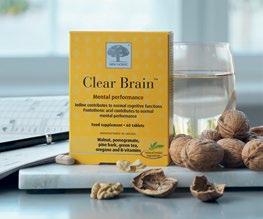
The more of our lives we commit to social media and the internet, the more our data is vulnerable to exploitation. But what happens when the government is privy to that information?

A STATE OF SURVEILLANCE
BY Chris Menon illustration by Daniel Mitchell
It may be 2020 but for some it increasingly feels like 1984, George Orwell’s fictional dystopian world where citizens are spied upon 24/7, potentially guilty until proven innocent.
For instance, you’ve never committed a crime and are a peaceful, law-abiding citizen. Yet, your face may be routinely captured by live video and matched to a database of "persons of interest" to the police. If matched, the onus is then on you to prove your innocence.
This example isn’t taken from China or some other despotic regime but here in Britain, as both South Wales Police and the Metropolitan police now use automatic facial recognition (AFR) to perform identity checks in real time.
“We now have cameras that are doing semi-covert identity checks en masse on hundred of thousands, even millions of people, who are innocent citizens going about their business. It is the hi-tech equivalent of "show me your papers." We don’t have arbitrary identity checks in the UK but that is exactly what live facial recognition does,” says Silkie Carlo, Director of Big Brother Watch.
The technology also has particular problems accurately identifying people, specifically darker-skinned individuals and women. “When we did our first report on trials by the Metropolitan Police it was 98 per cent inaccurate—I think it's now 96."
WE'RE CONFRONTED DAILY WITH NEW REVELATIONS ABOUT GOVERNMENTS USING TECHNOLOGY TO EXPLOIT OUR DATA
Big Brother Watch, founded in 2009, seeks to roll back the surveillance state and it isn’t alone in calling for AFR surveillance to be outlawed. Other civil liberty groups, such as Liberty and Privacy International also want it banned.
Presumption of innocence
"If you’ve done nothing wrong then you have nothing to fear", may be the knee-jerk response of some but Carlo points out that AFR, “completely subverts the presumption of innocence that you [are supposed to] have in a democracy”.
Why is this so important? Tamsin Allen is a partner at law firm Bindmans and acted for Christopher Wylie, the Cambridge Analytica whistle-blower. She explains that while a citizen forgoes some of their liberty in return for protection by the State it should be the minimum necessary—a core principle of the Convention on Human Rights. “It is critical, particularly in the area of surveillance, that this delicate
balance is maintained and an individual does not give up more rights to the State than he or she has to in order to allow the State to carry out its functions.”
Allen explains: “The fundamental right to the presumption of innocence is important in this context. The State usually has the burden of proving that an individual has been involved in wrongdoing, and the individual is presumed to be innocent. But, if the State has all the information and all the power, then the individual is effectively forced to prove they are not guilty. That is a major shift in the relationship between the individual and the State, and a very worrying one.”
Dr Ilia Siatitsa
The secrecy that surrounds the ever-expanding collection and use of our data is an issue of great concern to many. Dr Ilia Siatitsa, Programme Director at Privacy International argues that this lack of transparency is a deliberate exploitative tactic increasingly used by companies and governments to escape traditional forms of scrutiny and safeguards.
This might sound like paranoia but, as both Siatitsa and Carlo point out, the release of the Snowden files in 2013 [see box 1] was one of the key moments in history when international media revealed the
extensive secret mass surveillance operations of the US, UK and other intelligence agencies around the world, aimed at national and foreign citizens alike.
Siatitsa stresses that widespread abuses continue, stating: “We’re confronted on a daily basis with new revelations about governments and corporations using technology to exploit our data at the expense of our liberties and protections.”
For example, in 2018 Privacy International submitted a complaint to the UK Information Commissioner’s Office (ICO) revealing how police forces across the UK have been taking data
from people’s phones, including the victims of crimes, without an appropriate legal basis or oversight.
In response, the ICO issued a report in June calling for reforms and safeguards, such as a Code of Practice on mobile phone extraction to ensure people’s rights are protected.
The increase in use of fake mobile phone towers (formally known as IMSI-catchers) also allows police forces, often without warrants, to collect mobile phone information from all protesters who happen to be located in their proximity.
EDWARD SNOWDEN
Edward Snowden is a US whistle-blower who copied and leaked highly classified information from the US National Security Agency (NSA) in 2013 when working as a subcontractor for it.
His revelations alerted the world to numerous global surveillance programmes run by the NSA as well as the combined intelligence agencies of the US, UK, Australia, Canada and New Zealand, otherwise known as "Five Eyes".
He revealed that the US and British intelligence agencies have successfully cracked much of the online encryption relied upon by hundreds of millions of people to protect the privacy of their personal data.
For example, he revealed a secret programme known as "Tempora" under which the British Government Communications Headquarters (GCHQ) taps into transatlantic fibre optic cables carrying the world’s phone calls and internet traffic data, which is then shared with the NSA. Tempora is said to include recordings of telephone calls, the content of email messages, Facebook entries and the personal Internet history of users. In an interview with the Guardian newspaper Snowden said of Tempora that: "It's not just a US problem. The UK has a huge dog in this fight…They [GCHQ] are worse than the US.”
In addition, the documents claimed that the NSA via its "Prism" programme obtained direct access to the systems of Facebook, Google, Apple and other US internet giants. This allowed it to collect material such as search history, the content of emails, file transfers and live chat.
This was apparently done under secret agreements with these commercial companies, described in one document as "intercept partners”, although publicly the companies have denied this.
Terrorism
Diane Abbot, a Labour MP, points out that “a great deal of state surveillance has been introduced in the name of fighting crime in general and terrorism in particular.” Those justifying the expansion of such surveillance argue that it prevents terrorism “because they know that it makes people afraid, that it’s a threat we cannot see and the harm is acute”, adds Siatitsa.
Richard Norton-Taylor, former security and defence editor at the Guardian and author of The State of Secrecy nevertheless questions its effectiveness. “Mass surveillance and data storage makes it more difficult for security and intelligence agencies to concentrate on potentially truly dangerous individuals. Bulk data storage may from time to time allow the agencies to connect a current threat with an individual whose communications they have intercepted in the past, but an assumption that they will find a lead or relevant connection from the past gives the agencies a false sense of security, dulling their senses.”
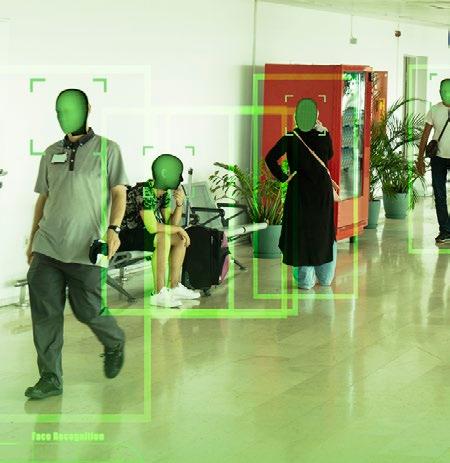
to hold them to account. Liberty explains that the “security services have been breaking the law for years”. They cite information that was revealed from documents MI5 had to disclose during litigation against the Snooper’s Charter, otherwise known as the 2016 Investigatory Powers Act. [see box 2].
Just as worrying is the revelation from Liberty that our intelligence agencies break the law and lie to the Investigatory Powers Commissioner’s Office (IPCO), which is supposed
According to Liberty; “The documents reveal that MI5 not only broke the law, they failed to report this to IPCO, despite knowing about their non-compliance for years. They also gave IPCO false information to obtain warrants.”
Given its failings and the dangers it poses to our basic freedom, Silkie
Carlo finds the lack of Parliamentary debate on state surveillance disturbing. Diane Abbott agrees and laments: “Once you utter the word ‘terrorism’ most British politicians do not question what is proposed. This is as true of Labour politicians as Tory politicians.”
Asked about the lack of debate, Baroness Jones of Moulescoomb, a Green Party member who sits in the House of Lords, maintains: “We do debate these issues in Parliament, and there’s a lot of us who are very concerned about the loss of civil liberties, but with a majority of 80plus in the Commons the government can more or less do as it pleases.”
Moreover, a lot of government legislation is pushed through “with virtually no scrutiny, through a mix
of statutory instruments and by embedding ministerial control within bills,” adds Baroness Jones.
Baroness Jones would like to see the government involve organisations such as Liberty and Big Brother Watch directly in the process of drawing up such legislation and also “ensure that when you give the security services surveillance powers, there are sunset clauses so they have to be constantly reviewed, that judges have to have sight of warrants and you abandon any legislation that allows general sweeps of the population.”
Privacy International’s Dr Siatitsa appears to be very much in agreement, arguing that: “Whenever a new form of surveillance is introduced we need to ask what its added value will be, and its impact
THE 2016 INVESTIGATORY POWERS ACT
This law, widely known as the "Snooper’s Charter", allows the UK security and intelligence agencies to intercept and store all of an individual’s emails, texts, calls, location data and internet history.
According to Richard Norton-Taylor: “They can also hack into our phones and computers and create large ‘personal data sets’ on individuals, without the need to suspect any criminal wrongdoing.”
These agencies are monitored by an Investigatory Powers Commissioner, a senior judge, and by a Security and Intelligence Committee consisting of peers (members of the House of Lords) and MPs vetted and approved by the Prime Minister. Although Norton-Taylor reveals: “The bodies are weak; what is needed are better resourced and independent bodies.”
on human rights. We need to ask whether there is a publicly accessible legal framework and whether the measure is necessary in a democratic society and proportionate to the aim pursued. We must be sure that safeguards are there in place to mitigate the risks arising from increasingly intrusive powers. Mass surveillance isn't the solution.”
In the opinion of Carlo, government secrecy and lack of oversight are ushering in “a shadow surveillance state” that makes use of authoritarian surveillance technologies that could have been lifted from the pages of George Orwell’s novel 1984. Will we wake up to the danger and reverse this trend?
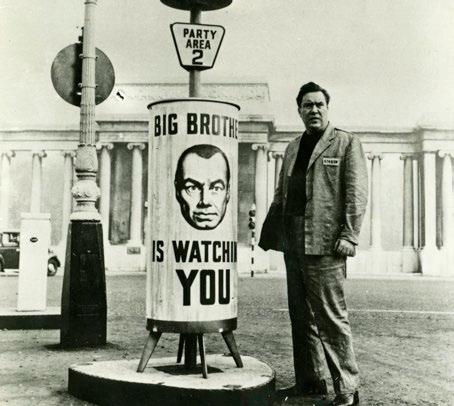
Edmond O'Brien as Winston in the 1956 adaptation of 1984
a fearful state of conformity among all citizens.
Norton-Taylor, who is familiar with the wiles of Whitehall and its spooks over the past 40 years, isn’t confident: “The trouble, particularly in the UK, is that most people regard the state as benevolent, a force for good, rather than a threat in any way. I am not so optimistic.”
That’s not just bad news for those immediately threatened by the hard edge of the surveillance state, detailed by Carlo as those with mental health problems, peaceful protestors and young black men. Ultimately, she warns that surveillance could induce
“If we really want to think about where the drift towards a surveillance state leads we just have to look to China, because that is the blueprint,” she says.
Based on the evidence, it’s hard to disagree with Diane Abbott MP’s assessment—“There is a danger that Britain is becoming a surveillance state”
However, whether the nightmarish society predicted by George Orwell in 1984 becomes a reality in the UK still depends on us, the great British public. n

"I really believe I shall always be talking of Bath, when I am at home again. I do like it so very much… Oh! Who can ever be tired of Bath?"
from Northanger Abbey, by Jane Austen

My United Kingdom: BATH
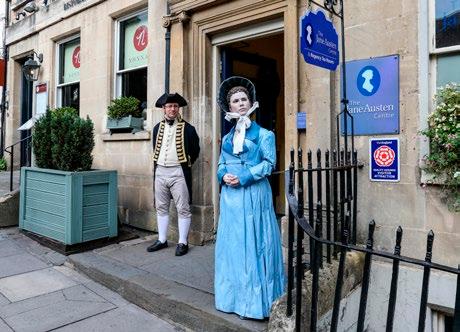
Walking around the refined city of Bath, you can almost hear the honey-coloured limestone of its buildings whispering tales of its history in your ear. First settled in the 7th century, Bath's name comes from its famous thermal spring waters, which first brought the Romans to its walls, transforming it into a spa town with their historic baths, which can still be visited today. In the Georgian era, Britain's wealthy flocked to the city to sample the healing properties of the waters, and Bath became the place to see and be seen, hosting balls enjoyed by the upper eschalons of British society. In the early 19th century, Jane Austen called the city home, and her influence can still be felt in the myriad Austen experiences and souveniers available throughout the city. Visitors to Bath today are as likely there to swoon at the Jane Austen Museum as they are for a visit to the thermal waters, or stroll along the magnificent architecture of the Royal Crescent.

MIKE JAMES, 46, has lived in Bath for over ten years. He's runs Savouring Bath, who offer hugely popular foodie tours of the city.
I moved to Bath in 2010 with the intention of staying for two years. After six months, I had no intention of living anywhere else—Bath is home.
I was born in East Yorkshire and came to Bath entirely on a whim. I knew almost nobody here, but having lived in York I always saw Bath as the “Yorkof-the-South”. It has a big, old church; it has a thriving tourism industry; quaint old streets; beautiful architecture, and lots to do and see. I also quickly learned that Bath also has a wonderful, friendly community vibe.
The independent business scene in Bath is something I really love about the city. So many people come here to try out new business ideas, which I guess is because we’re very open to new concepts. We like to see innovation and want to be part of it. This means we’ve got a great hospitality scene with
some really interesting places to eat and drink. There's everything from a worldrenowned, champion barista to a unique single-estate tea merchant, whose gyoza dumplings have gained something of a local cult following.
I’ve been a tour guide since I was 17 and combining my love of food, with my love of the independent business movement for my work as a tour guide with Savouring Bath has been the most natural process, and something which I don’t think I’ll ever stop loving.
Bath has such a plethora of great artisan food and drink outlets for us to share with visitors, that we have a selection of different tours we’ve developed over the years to ensure we can share them all. Each tour is different and lasts three hours, including visits to independent culinary artisans with a sample at each stop, representing in total, a meals' worth of food. So instead of taking a walking tour with a guide for a couple of hours, then going for dinner or lunch… you can combine the two into one activity and sample some great food along the way! We don’t reveal in advance where we’ll be visiting as all our feedback has shown that the surprises are the best part.
Jars Meze is one of Bath's great hidden gems—a Greek restaurant and family business in Northumberland Place which is an alleyway hidden off the high street. The Jars family who all work in the restaurant are from Corfu,

and Mamma Giouli’s Corfiot inspired dishes always take me back in my mind to the island, where my partner and I once worked. It never ceases to amaze me that food and drink can inspire memory with such intensity. To have a small part of Corfu in my home town is something I truly relish and make use of!
My favourite spot in the city is a bench in the Royal Victoria Park which looks up towards the Royal Crescent. It was there in 2017 that I got down on one-knee and popped the question to my partner before we went into the fabulous Dower House restaurant at the Royal Crescent Hotel for a celebratory engagement dinner. The views of the Royal Crescent from the park really evoke the city’s rich history of the18th century golden age.

It’s not difficult to imagine characters from period novels by the likes of [former Bath resident] Jane Austen wandering through the park or along the streets from there. I also love to sit there and watch the hot air balloons depart from the park and fly over the Royal Crescent during the warm summer evenings.

CHRIS STEPHENS, 55, is the director of Bath's Holburne Museum, which showcases fine and decorative art.
I have lived in Bath full-time since 2017, when I became the director of the Holburne Museum, but I had been dividing my time between here and London for 12 years before that. Bath reminds me a lot of my time studying in Edinburgh. The architecture is similar, of course, but I also love that it's a city
small enough to walk across, to constantly bump into people you know and to have a sense of as a whole but big enough to have a rich cultural life. It’s smaller than Edinburgh, obviously, and warmer in both its colour and its climate. It's hard to capture a single Bathonian spirit— here are all sorts of people with different traits and interests. One minute the city might seem very grand and metropolitan, another you definitely know you’re in the West Country.
One of the things I love about Bath is that it has managed to preserve a number of small businesses, independent shops and old-fashioned pubs. The Little Theatre, Bath Old Books at the top of Margaret’s Buildings, The Old Green Tree in Green Street are among the places I love. I love wandering through the back streets in the evening, when you might suddenly find a corner which seems not to have changed for 200 years, but most of all I love to walk out the back of the Holburne Museum, drop down on to the canal tow path and in minutes you feel as if you are in the countryside.

The Holburne was Bath’s first art museum, given to the

city by the Holburne family in 1892, though it only moved into the historic Sydney Hotel at the end of Great Pulteney Street in 1915. In many other cities, it would be recognised as the cultural highlight, if not the city’s claim to fame, but it is a reflection of the richness of Bath’s cultural offer that to many it is part of a network of museums and galleries all of which add value to the city.
I am extremely proud of the different ways in which the Holburne contributes to the life of the city and engages and supports different local communities, but I came here because it is an art gallery of national importance with a reputation greater than its size.
This is such an exciting time for museums as the pandemic is forcing
cultural and behavioural change in such an accelerated way. As we reimagine cities in light of the climate emergency, especially tourist hotspots now mpacted by the virus, organisations like the Holburne have a crucial role to play.
Has the city changed since I arrived?
Or is it my perceptions that change?
Bath is one of those places which sometimes feels as if time has left it alone but when you look closely you can see it has undergone constant change, as anywhere does. I am more concerned about how we shape the ways it will change in the future so that it retains the best bits of what it has managed to keep until now, and recent developments, but becomes a healthier, cleaner, more equal and diverse city. n
Neil Oliver is a Scottish TV presenter, archaeologist and author, best known for such shows as Two Men in a Trench, A History of Scotland and Vikings
If I Ruled The World
Neil Oliver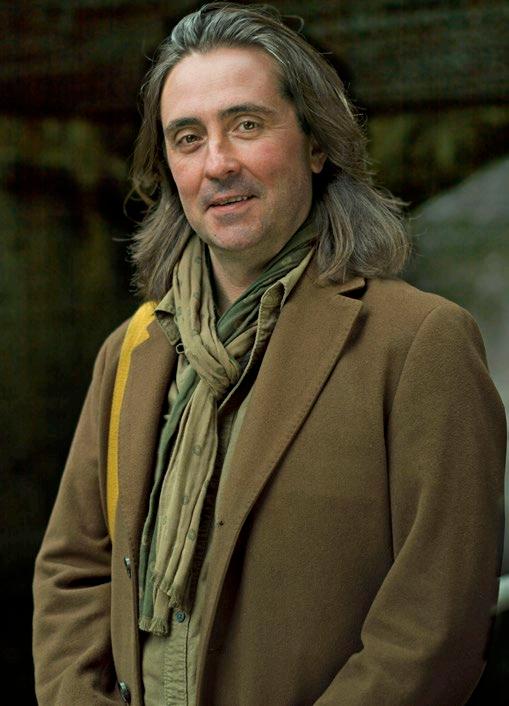
Dogs would be compulsory. We’ve owned our Irish wolfhound, Gracie, for four years now and she has changed our lives for the better. She was a huge part of maintaining everyone’s wellbeing through lockdown because she made us go out for a walk every day and that kept us rooted in the real world. Having a dog teaches people so many things, starting with the fact that you have to put someone else first. You have to go out come rain or come shine because you’re responsible for another living thing. Plus, dogs are wise in ways that make your heart feel good. They’re nonjudgmental. If you’re kind to your dog, your dog is kind to you; it’s a very simple and straightforward transaction. They’re a huge force for good.
I’d enforce kindness. Especially in the current climate, where
people are so quick to condemn individuals they don’t know. When you encounter someone, your default settings should be kindness until you know differently. We’ve known this for thousands of years, but how readily we forget them in our own times. I have this non-scientific theory that we have evolved to be suspicious of strangers because a new group coming in could bring diseases for which we have no defence, so the body tries to protect itself from the possibility of contagion. And because of the virus and social isolation, our ancient mechanisms are being triggered. It’s no coincidence that off the back of four months of lockdown, we’re seeing so much hostility between communities.
Everybody would shop and eat locally. During the lockdown, we were able to fall back on farm shops and other local places that we overlooked in the past. These places have really geared up so they could make deliveries to people when they weren’t allowed to go out to the shops. I’m now loyal to these people. It’s good for environment. It’s good for local business.
I would raise the penalty for littering to ten years of compulsory litter collection on weekends. I’d make it as draconian as possible. When I drive around the back roads
in Stirling, I see so much fly tipping, people are dumping rubbish in laybys. But also, the casual littering that I see all the time—the streets are littered with packaging, and it’s an anathema to me. My mum and dad raised my sisters and I to pocket our litter and take it home or to a bin.
We’d eat together with those we love. I’m 53, married and have three kids and the lockdown was made tolerable by the fact that I had them. My wife has always been very much of the opinion that we should cook and eat a meal at least once a day without phones. Homo sapiens are the only creature that can look its own kind in the eye while feeding. It’s unique to the human species and it mustn’t be neglected.
We’d drive slowly in towns. I live in a suburb and when I drive around, I keep the speed below 20 because I remember an information campaign years ago that said that if you hit someone at 30 miles an hour, especially a kid, you kill them. If you hit someone at 20 miles an hour or slower, you might hurt them but you almost certainly won’t kill them. And to me, the means that the speed limit should be 20. n
As told to Eva Mackevic Wisdom of the Ancients: Life Lessons from our Distant Past by Neil Oliver is out on September 17 at £20.00







Beautiful Gates and Railings ColourRail









you won’t have to paint for 10 years † †
NO RUST! NO FLAKING!
Why ColourRail? “
Quality galvanised steel with architectural grade powder coat finish
Customise your look with 6 designs and multiple choice of colours
10 year maintenance-free guarantee – no corrosion or peeling
‘ALL-IN’ pricing – NO hidden extras plus our NO pressure promise
ColourRail won’t corrode or flake for 10 years. That’s guaranteed. And normally, you can expect it to last for 30+ years. A beautiful, maintenance-free addition to your home. Custom built from quality galvanised steel with architectural grade finish in our UK workshops to deliver truly affordable value. ColourRail can be provided on a supply only, or a supply and fit basis via one of our fully trained and accredited Franchisees.
6 DESIGNS
†Terms & conditions apply.

Mrs Stoneson, Scotland “
The team worked really hard despite freezing weather conditions! They were professional, accommodating, I cannot praise them enough. My garden looks great!
BLACK FLAT TOP BLACK BALL TOP RAIL


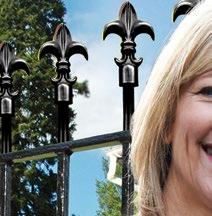

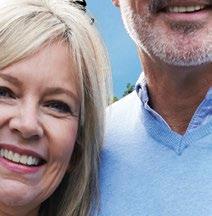

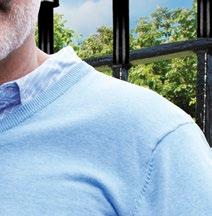












REPLAYING INSPIRE

Royal Ulster Constabulary policemen search for weapons and ammuninition in wasteland during the Troubles
ALAIN LE GARSMEUR "THE TROUBLES" ARCHIVE / ALAMY STOCK PHOTO

OUR TROUBLES
As the BBC embark on a spate of programmes marking 50th anniversaries of the Troubles, Adam McGibbon asks if replaying Northern Ireland's trauma in the media is preventing the country from healing
“Do you feel the weight of your past?” The billboard asked me. “Is there conflict in your blood?” another interrogated. The searching words were enveloped in images evocative of Northern Ireland’s violent history. Faces of riot police shrouded behind shields, barbed wire, licks of flame.
The billboards for BBC Northern Ireland’s new series of documentaries marking the 50th anniversary of the beginning of "the Troubles" were lauded in the trade press. Creative Review described the campaign—aimed at viewers under 35—as using "provocative headlines… aimed to spark debate and conversation. A brave approach for the BBC to take with such a polarising and sensitive issue."
As someone in the target audience group, I didn’t feel polarised or provoked. Instead, it confirmed a feeling I’ve had for some time—that the way in which our media in Northern Ireland constantly replays our most horrific moments is retraumatising the people who had to live through it, and passing those grievances onto a new generation.
Marking our most terrible events has always been a big part of business for Northern Ireland’s media, drawing in huge audiences. For example, I, someone born in early 1988, can watch an hourlong 2013 BBC NI programme about the deadly cycle of violence
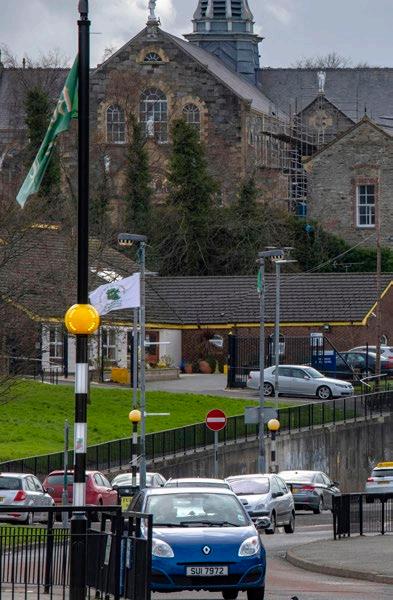
of March that year—the Gibraltar killings, the Milltown Massacre and the "corporals killings". BBC Two later commissioned an hourlong film about the same event. A 2012 documentary looks back at the 40th anniversary of Bloody Friday, showing the chaos of that day when 22 car bombs exploded in Belfast within 80 minutes. Is a 50th anniversary programme planned for 2022? Even when these innumerable programmes disappear from BBC iPlayer, they’re freely available on YouTube.

Specific programmes are uploaded by individuals depending on whose side’s narrative of victimhood they fit best, with millions of views between them all.
Last year marked the beginning of the latest train of BBC commemorations—50 years since the upheaval started in 1969. A six-part investigative series was produced. Seven programmes called On The Frontline looked at the experiences of bus drivers, police officers, teachers and more.
UTV (ITV in Northern Ireland) commissioned a very similar series.
Now that we’re locked into a whole series of 50th anniversaries of our most terrible events, as we relive 1970, 1971, 1972, it’s the right time to ask—should we really be doing this?
There is an over-emphasis on all the awful things that have happened, the things that continue to shape Northern Ireland’s divided society. We’re not at war, but not at peace either. There is little focus on the peacemakers, and much more on the perpetrators of violence and
their victims. For a society whose politics is still struggling to move past the Troubles, is this constant repetition actively harmful? Or am I just-overreacting?
I ask my parents, who lived through it from start to finish. They're on coronavirus lockdown in Belfast when I call. They’re coping fine, and with typical Belfast dark humour, say that lockdown reminds them of some of the darkest parts of the Troubles because “you aren’t allowed out!”
Mum thinks I could be right, but says she avoids watching those programmes. Dad says he watches them, but wonders whether it’s good
9/11, the Boston Marathon bombings and wildfires. When we speak, she is about to start a study on COVID-19). She hasn’t studied Northern Ireland, but she tells me what I’m talking about might have some truth in it—watching traumatic events that happened in our collective past, even if we weren’t directly involved, can resurface feelings of hurt and distress.
“That coverage could certainly be creating some stress, creating distress, and helping to keep people focused on past events,” she says. Holman is keen to emphasise that this doesn’t mean we shouldn’t know our past—but it’s about the
“A GROWING BODY OF RESEARCH LINKS VIEWING TERRIBLE EVENTS
VIA
MEDIA TO TRAUMA AND STRESS”
for him to watch them. He says that it often reminds him of some of the awful things he’s forgotten about.
But does anyone seriously believe that just watching TV can traumatise, or pass on hurt to a new generation? I contact Dr Alison Holman at the University of California Irvine. Holman is an intensive care nurse turned academic, who has written scientific papers on how, yes, trauma can be transmitted through the media. She has studied the media’s effects in a long list of horrific events (including
way in which these stories are retold. “My concern would be that it would rekindle and re-energise feelings about these old events. That would rekindle the emotions and stress and that may have downstream effects.”
Holman isn’t alone in thinking this. A growing body of research links viewing terrible events via media to trauma and stress.
Professor Amit Pinchevski from the Hebrew University of Jerusalem points out that there is a lot of

research into "collective trauma"—trauma across a whole society, particularly when it comes to the children of Holocaust survivors and how hurt and trauma is passed on to a new generation. I've come across similar research about the 1965 Indonesian genocide, and how deeply affected relatives of the victims are by watching a documentary about an event that happened before they were alive. It makes me think of the similarities with Northern Ireland and again wonder what we’re doing to ourselves.
Bloody Friday is the name given to the bombings by the Provisional Irish Republican Army (IRA) in Belfast on July 21, 1972
He's clear that trauma in an individual isn't the same, psychologically, as collective trauma across a whole society but agrees that there could be some truth in what I’m saying. “You’re suggesting that there's a certain way in which you present and narrate history, which brings about a certain interpretation of it, a certain repetition of it.”
Suddenly it doesn’t seem so farfetched—especially in a society with a rate of mental illness 25 per cent higher than the rest of the UK and half the mental health budget.
Professor Pinchevski has written a book, Transmitted Wounds, about the ways media can transmit trauma.
It’s not that there isn’t positive BBC NI programming, but the

story we tell ourselves about our past is overwhelmingly negative. Peacemakers , a 2017 series about groups of people who worked in the hardest circumstances to make peace, is an example of the more positive side, but could have easily been longer than just three episodes. Another is the 17-minute short Two Angry Men , featuring Line of Duty ’s Adrian Dunbar, examining a 1959 attempt to stage an antisectarian play in Belfast.
Tellingly, neither of these are currently available on BBC iPlayer or YouTube, but the mountains of programmes about violence are available in spades. There is a rich, largely untapped past and present of peacemakers and bridgebuilders, struggling for peace and reconciliation both then and now. There needs to be far more focus on them, and much more on the grassroots rather than elite decision-makers. Viewers need to
In the streets during Bloody Sunday, when paratroopers opened fire on rioting Catholics in Londonderry, killing 13 people
see examples of people just like them, working for reconciliation. But right now, for every programme about our shaky peace, there are ten more about our war.
Part of the problem is that these programmes about our violent past are hugely popular. When we speak, both Dr Holman and Professor Pinchevski ask me why. I believe it’s because we are, all of us, young and old, transfixed by our collective troubles. Like a car crash, we're darkly fascinated by the horror of it all. This collective fascination makes sense to Pinchevski.
"There’s an attraction to the outrageous and disastrous."
Someone like me, who didn't live through most of the violence, can easily feel a gut-punch at seeing footage of Bloody Sunday from 1972. A feeling of dread seeing the replayed corporate killings footage from the year of my birth. And I know I'm not alone—the BBC’s
Ads on the Frontline replays 1990s
Troubles-related TV ads to selected present-day viewers, leaving some of them in tears.
These programmes are often excellent journalism. But we aren’t considering the impact this is having on our ability to move on. How can we move on, when our past can be instantly recalled online or through on-demand TV? Type "Northern Ireland" into YouTube and there’s plenty of dark documentaries, with no counterbalance about peace and reconciliation. I ask Professor Pinchevski if he thinks that’s something that's made worse by the internet age. “Absolutely. If it’s always in your face, so accessible and watchable endlessly, it makes it more difficult to put it in context. To take some critical distance, to put it in a process as part of a larger context in which to make sense. The ubiquitous nature of that presents problems— the extreme visibility paradoxically obscures some things.”
So, yes—the instant ability to recall this is damaging us, damaging our society, even damaging our politics. It’s no exaggeration to say that people walk into polling booths with decades-old atrocities fresh in their minds. And our media, focused on sensationalism, is not helping us move on. The BBC thinks differently. They tell me they make these programmes with care and
sensitivity, that they get high levels of audience engagement and in 2019 the overwhelming majority of their non-news content wasn’t about the Troubles. But it’s not about the quantity—it’s about the story we tell about our past, and how it keeps the old grievances alive.
There are amazing stories, now and in our past, that need to be told. Trade unionists that went on strike to stop violence, who were the backbone of the successful Good Friday peace agreement campaign. Parents who rejected segregated education and risked everything to start schools where Catholics and Protestants could be educated together. Community workers who do the unseen work every day, promoting reconciliation street-by-street. A million untold stories where communities came together to fight common causes, despite the division. We need these stories to balance the horror of what happened, and to help us realise that we have a rich history of peacemakers not just war-makers.
Telling these stories, showing that our past isn’t entirely a violent one, helps to heal our present and build our future. So let’s tell them. n
Adam McGibbon is a writer from Belfast, Northern Ireland. He also writes for The Guardian, The Independent, The New Statesman and others.





Moments That Changed History
Altering the course of human events takes a grand idea and careful execution—most of the time.
But at these fateful points, plans went out the window…
By Jacopo della Quercia
melted chocolate bar helps create the microwave
Percy Spencer was so fascinated by the sinking of the Titanic that he became a scientist. He joined the US Navy, trained as a radio electrician, and ultimately became a civilian expert on radar during the Second World War, earning the Distinguished
Public Service Award for his work.
And he did it all without ever having finished secondary school.
After the war, Spencer worked for Raytheon Manufacturing, a defence contractor. As he was walking near the radar equipment one day, he absentmindedly stuck his hand in his shirt pocket—and found a gooey

mess. Spencer often carried a Mr Peanut chocolate bar to feed the squirrels at lunch. He knew enough about radar to suspect that its heatproducing magnetron waves could be the culprit, but he wasn’t sure. So he placed a bag of popcorn kernels in front of the machine—and they popped. Then came a raw egg, which dutifully exploded all over a skeptical colleague’s face.
Spencer fine-tuned his discovery with Raytheon and marketed it to airlines, railways, restaurants, and cruise liners as “the Radarange”—or, as it’s known now, the microwave oven. Fortunately, microwave units have come a long way since 1947, when they stood nearly six feet tall, weighed 750 pounds, and cost £3,000. That’s roughly £25,000 today.
A coconut saves JFK’s life August 2, 1943, began as a cloudy, moonless night in the South Pacific
for 26-year-old Navy lieutenant John F Kennedy. As Kennedy and his crew patrolled the Solomon Islands from their boat, PT-109, a Japanese destroyer pierced through the fog and sliced the smaller ship in half. An enormous fireball filled the sky, and two men aboard PT-109 were killed. As Kennedy and ten other survivors huddled around the wreck, they realised they had no choice but to swim to a nearby island. Kennedy, a former member of the Harvard University swim team, personally towed one of his wounded comrades with his teeth for five hours through shark- and crocodile-infested waters to Plum Pudding Island, where they ate coconuts to survive.
After several days, the men flagged down two Solomon Islands natives passing in a canoe, who agreed to take a message to the Allied forces. The dispatch was carved into a coconut shell: “ NAURO ISL…

COMMANDER… NATIVE KNOWS POS’IT… HE CAN PILOT… 11 ALIVE… NEED SMALL BOAT… KENNEDY .” The islanders delivered the coconut, and the men were soon rescued.
Years later, Judge Ernest W Gibson Jr, a colonel in the South Pacific during the war, surprised the newly elected President Kennedy with a gift. It was the coconut he had carved his message into. Kennedy had it encased in plastic and used it as a paperweight throughout his presidency. Today, it is on permanent display at the John F Kennedy Library in Boston.
Dr Seuss and Stephen King are rescued from the dustbin of history
Different though they may be, Stephen King and Dr Seuss have two things in common. They're both hugely successful authors, and they both made a narrow escape from a life of obscurity.
Theodor Geisel—the good doctor’s given name—wrote his first children’s book, A Story No One Can Beat , in the mid-1930s. Working as an advertising illustrator at the time, Geisel sent his whimsical manuscript to 27 publishers. They all rejected it. After the last cold shoulder, Geisel stomped down New York City’s Madison Avenue, determined to burn the manuscript and, perhaps, his writing career.
While he was out cooling off,

he bumped into his old university roommate, Mike McClintock, who happened to edit children’s books at Vanguard Press. Geisel shared his woes with McClintock, who asked to see the story. McClintock suggested a few changes, and Vanguard published the book in 1937 with a new title: And to Think That I Saw

down the other side of Madison Avenue, I’d be in the dry-cleaning business today.”
Stephen King’s first published
book was about a bullied teenage girl who discovers that she has fantastic mental powers, which she uses to get revenge on her tormentors. King’s worst critic wasn’t the publishers—it was himself. He disliked his story so much that he threw it away after writing only three pages, according to his memoir On Writing.
A few hours later, his wife found the pages crumpled and covered with cigarette ash in their wastepaper basket. She took the pages out and started reading, and she was hooked.
“She wanted me to go on,” King later wrote. “She wanted to know the rest of the story.” And so he did go on. Carrie went on to sell over a million paperback copies in its first year alone.

A lawyer’s slip flips the trial of the century
It was bound to be a case for the ages even before the suspect parked his white Ford Bronco on that hot Los Angeles night in 1994. OJ Simpson—football legend, rental car spokesperson, sometime movie
“IF IT DOESN’T FIT, YOU MUST ACQUIT” HAS BECOME LEGENDARY

star—was accused of killing his wife, Nicole Brown Simpson, and a local waiter, Ron Goldman, on the steps of Nicole’s posh home in Brentwood, California. The evidence against OJ would appear to be damning, including blood in the Bronco and on a glove that matched one found near Goldman’s body. “ DNA evidence” became a household term with the OJ Simpson trial, and it was not his friend. Neither was a man named Kato Kaelin, who was living in OJ’s guesthouse and testified that he could not account for OJ’s whereabouts at the time of the murders.
OJ Simpson’s team had plenty of its own angles to work. The trial unfolded just a few years after the Los Angeles riots, and the racial polarisation of the city was palpable.
In fact, the defence team took pains to label one of the Los Angeles Police Department officers investigating the case, Mark Fuhrman, as having a history of making racial statements.
Still, many observers believed OJ would be convicted. And then the prosecutor asked him to try on the bloody glove found at the crime scene. The image of OJ Simpson attempting to squeeze his meaty hand into the snug leather fingers became a defining moment in the trial, as did the way defence attorney Johnnie Cochran described it in his now-historic closing statement: “If it doesn’t fit, you must acquit.” And the jury did.
A messy science lab harbours a miracle drug
In the summer of 1928, Scottish physician Alexander Fleming was in such a rush to go on holiday that he accidently left a stack of dirty petri dishes in his laboratory sink. As if this weren’t already gross, the dishes were smeared with staphylo coccus, a bacterium that causes boils, sore throats, and food poisoning (let’s hope the doctor at least washed his hands before he left).
When Dr Fleming returned weeks later, he found something interesting in the mess in his sink: One of the petri dishes was dotted with bacteria everywhere except for where some mould was growing. The area around it was clear, as if

MOULD JUICE IS PERHAPS THE MOST UNLIKELY LIFESAVER IN HISTORY
protected by an unseen barrier. Upon closer inspection, Dr Fleming realised that the mould, a rare form of Penicillium notatum, had secreted a “mould juice” that killed several strands of deadly bacteria. Dr Fleming published his remarkable discovery— and almost no one noticed.
In fact, years later, Howard Walter Florey, an Australian pathologist, found Fleming’s paper by accident while leafing through old medical journals. Along with biochemist
Ernst Boris Chain, Dr Florey began to explore the therapeutic effects of the mould juice, and by 1941 they had collected enough penicillin to use on the first human subject, a 43-yearold police officer suffering from a terminal bacterial infection he’d contracted after scratching himself on rosebushes in his garden. The results were astounding: the patient’s fever dropped and his appetite returned, and the penicillin used to treat him was hailed as a wonder drug. Unfortunately, when supplies ran out, the officer’s infection returned and he died.
Still, Dr Fleming shared the Nobel Prize with Dr Florey and Chain for their work on the magic med. “I certainly didn’t plan to

revolutionise all medicine by discovering the world’s first antibiotic,” he remarked, “but I suppose that was exactly what I did.”
A dog gives the world Velcro Swiss engineer George de Mestral was a natural inventor. When he was 12, he designed and patented a toy aeroplane. As he got older, he considered nature the greatest inventor on the planet, so he kept
ZIPPERS CAN FREEZE IN THE COLD, BUT THESE “VELVET HOOKS” WON’T
his eyes out for naturally occurring phenomena science could imitate. That’s where his faithful Irish pointer came in.
After a day hiking in the Swiss mountains, de Mestral noticed that his dog was covered with spiky burs, as were his own trousers. He put the burs under the microscope and found tiny “hooks” at the ends of their bristles that seemingly latched onto most any kind of fur or clothing. Since de Mestral was no fan of zippers—they tended to freeze in the Alpine winter— he spent the next ten years trying to duplicate the burs’ irresistible attraction to his hiking partner.

After countless attempts and belly


rubs, de Mestral found the right material for his invention: nylon, which was strong enough for the hooks to hold but pliable enough to be separated with the right tug. De Mestral submitted his patent in 1952, and it was approved three years later. He named his invention Velcro, a combination of velvet and crochet, the French word for “hook.”
Ping-Pong ball

athletes watched the shaggy-haired American with suspicion—the United States had broken diplomatic relations with China way back in 1949, and the team had been forbidden to so much as speak to their American counterparts.
dents China’s Great Wall Glenn Cowan was practising for the 1971 World Table Tennis Championships in Nagoya, Japan, one afternoon when he realised that he was the only American in the room. He had missed the team bus back to the hotel! Undaunted, the 19-year-old Californian just hopped onto the shuttle with the Chinese national team. Most of the Chinese
But Zhuang Zedong, the team’s star player, stepped forward to shake Cowan’s hand. The two spoke through an interpreter, and Zhuang presented the American with a silkscreen picture of China’s Huangshan mountain range. Cowan, a selfdescribed hippie, returned the gesture the next day by giving Zhuang a T-shirt featuring a peace symbol and the words “Let It Be.”
After that spontaneous exchange of goodwill was beamed around the world, Chinese leader Mao Zedong invited the entire US team to visit. A year later, President Richard Nixon made his own historic trip to Beijing. n
 Sunset at Îles Sanguinaires, or the “bloody islands”
Sunset at Îles Sanguinaires, or the “bloody islands”
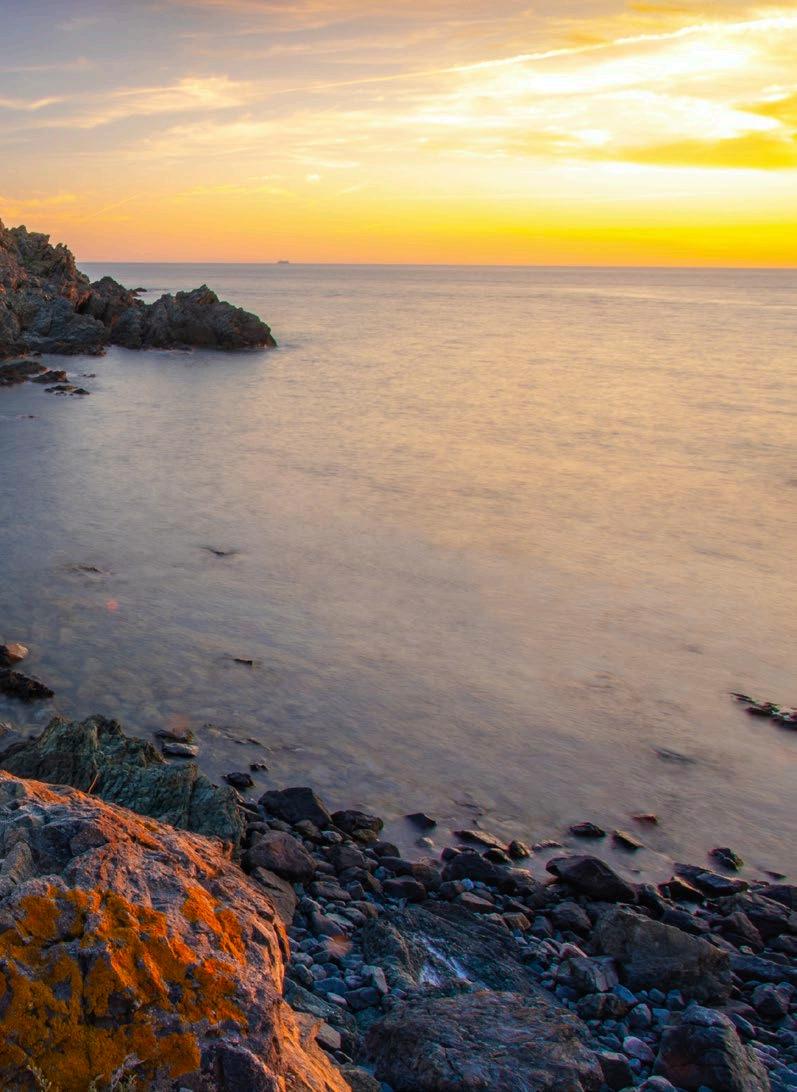
A search for harmony lures an American musician to this timeless Mediterranean island
Invincible
Corsica
By Dessa f R om Natio N al Geo GR aphicAbeautiful singing voice is alchemic—you pull a lungful of air through the human machine and it leaves, like magic, as music on the exhale. I’m a singer, so probably biased, but I don’t believe we’ve yet managed to design an instrument that rivals the reed we’ve got built in.
I was first introduced to the vocal group A Filetta by a listener at one of my own concerts, a poorly attended show in Germany. To distract the crowd from its own size, my bandmate Aby and I crammed
everyone into a stairwell, then sang Leonard Cohen’s “Hallelujah” in harmony.
Afterward I received an email from a man named Christian: "In a very, very quiet moment, please watch this." A link led to a video in which a greyhaired, trim man wearing a gold chain and a black dress shirt held a tuning fork to his right ear before dropping it into his breast pocket. When his mouth opened, his eyes shut, as if wired on a shared circuit. The sound he emitted matched his physical aspect—it was a boxer’s voice, abraded by time or suffering or both. His melody was mournful, urgent, like a funeral song for someone not quite dead. It featured the tense, fast vocal trills of tragic Portuguese fado music, or a call to prayer.

Shops and restaurants in Bonifacio, backdropped by the bell tower of the Saint Marie Majeure Church
Then, half a dozen other male voices joined in; the camera panned across their faces, dark lashes edging their closed eyes. Some sang in close harmony, some sang long vowels, like a bed of strings. I couldn’t understand the words, couldn’t identify the language. But I knew I’d never seen such undisguised passion in the faces of singers making such a religious sound. I played it again and again.
Googling, I learned A Filetta is from Corsica, a Mediterranean island territory

of France. The group’s charismatic leader is Jean-Claude Acquaviva.
I checked its website, hoping to find tour dates. Nothing. I checked again the next summer—no luck. Five years later, I was still checking, and then found that, to celebrate the band’s 40th anniversary, they’d perform a concert in the Corsican capital of Ajaccio. I bought a plane ticket.
Maps can’t tell the truth about Corsica. From above, it’s a patch of green against blue. But Corsica is mountainous—sheer cliffs rise from the surface of the Mediterranean as if it’s just cut its way out of the sea. The truth of the place is visible only in profile.
I arrive in Ajaccio a few days before the show with plans to meet a
Ajaccio’s beach, Plage Saint-Francois, and the city’s colourful promenade
Corsican filmmaker named Nico de Susini—the friend of a cousin of a friend who graciously agreed to orient me to the island.
Nico is tall and lean with silver curls, a French accent, and almost always has a cigarette—lit or unlit—in his right hand (“we are like an old place: everybody smokes here”). Over beers in a little bar, Nico introduces me to the culture: “Respect. It is the first and most important word.” Corsican children are instructed to respect mothers, fathers, siblings, neighbours, the elderly. “When we cross the road with old people, we take the bags.”
He stresses that Corsicans cannot be understood as fisherfolk: “We come from the mountain.” The cigarette gestures inland. They may
work on the coasts, but all have ties to a family village in the interior. Historically the mountain also provided a strategic position from which to defend against invasion; the island’s geographical position made it a tempting conquest. Although it’s been a region of France for more than 200 years, residents consider it more like an occupied territory—misunderstood and mistreated by federal powers. Corsicans’ allegiance is to their own flag, their own traditions, their own mountain. You can leash a wolf to a stake in the garden, but it’s nobody’s pet.

The proprietor sets down a plate of bread and meat. Corsicans are uncompromising about food—cheese and meat in particular. Earlier that day, at Le Don Quichotte restaurant, I’d marvelled at ribbons of pancetta shaved so fine I could read the newspaper through them. The medallion of warm chèvre on my toast was so flavourful and so yielding, I wasn’t even sure that it was cheese. The restaurant’s chalkboard menu listed the name of the shepherdess who’d supplied it, and I spent a few minutes admiring online photos of Johanna, goat kid in her arms.
125-mile
In the days before the concert, I walk through Plaza Foch, the openair food market where vendors sell hanging sausages, nuts, and small jars of candied fruit that shine like oiled gemstones. Corsican fare relies on simple combinations of local, fresh ingredients—citrus pulled from trees in the garden; olive oil pressed from local groves; and brocciu, a soft white cheese made from the milk of goats or sheep.
Then there’s the chestnut. It’s ground into flour for sweet canistrelli
biscuits; turned into paste to spread on fresh bread; made into liqueur; baked into a savoury polenta-like pudding; and enthusiastically consumed not only by the human residents of the island, but also by sangliers, semi-wild boars, whose meat is flavoured by their predilection for the nut.
I take a late afternoon bus to Pointe de la Parata to see Îles Sanguinaires, the “bloody islands” of red rock just off the coast. Gravel crunches beneath my boots on the path up. The view at the top is a postcard in every direction. The clouds are sun-roasted, the islands stark against the pastel wash of sea and sky. The pink light doesn’t seem to hit the rock, but feels attached to the air itself somehow, like vaporised rosé.
I visit the little resort town of Porticcio, a 20-minute ferry ride away, to meet a cutler who has agreed to show me his workshop and explain the tradition of Corsican knives. Simon Ceccaldi is sinewy and handsome with a quick laugh that he uses like mortar to fill holes in conversation. Standing in his oneroom storefront, he explains that the Corsican knife began as a shepherd’s tool; a herdsman would bring a horn from one of his animals to be fashioned into a handle and fitted with a blade.
Corsican “vendetta knives” are popular now, displayed here like jewellery. Some blades feature fine
OH, THE FOOD!
✦ Corsicans eat local and fresh. Trust the recommendations of your server, and survey neighbouring tables to see what the regulars are ordering.
✦ Bakeries are plentiful and tempting. Beignets au brocciu are sugared pastries with a bite of soft white cheese at the centre; the mild canistrelli biscuits are made from chestnut flour, sometimes flavoured with white wine or chocolate.
✦ If you like limoncello, look for homemade fare in unlabelled bottles. The local myrtle and maquis plants are also made into sweet liqueurs.
✦ In Ajaccio, take an evening walk down Roi de Rome, a few blocks lined with eateries, bars, and smoking Corsicans.
stripes of alternating black and silver, in liquid patterns. “Damascus steel,” Simon explains, has been heated and folded many times, forming hundreds of tight layers. I watch his hands as he gestures; the right palm is traversed with a thin white line. When I ask about it, he traces a finger down the scar and confirms it’s the product of a rare careless moment with one of his own blades.
We enter the workshop behind the store, walking past sanding belts, blade templates, and a machine that cuts steel with a jet of water. Blocks of ebony, oak, boxwood, and walnut sit on shelves, waiting to become handles. We follow the sound of
metal clanging to the forge where a man, backlit by fire, is battering a knife into existence.
The night of the concert, I trudge uphill in the dark toward the venue printed on my ticket: L’Aghja. I’m eager to see what sort of Corsican will be in attendance—old people
TRAVEL TIPS
GETTING THERE There are ferry services to Corsica from France and Italy, and several airlines (including Air France) serve the island. Check online or contact your travel agent for the most up-to-date information.
LODGING Hotel Napoléan, Ajaccio, is quiet, clean, and centrally located; its recent redecoration has a Napolean theme. hotel-napoleon-ajaccio.fr.
DINING Le 20123, Ajaccio, five-course dinner of traditional dishes includes ingredients provided by local producers; 38.50 euros (cash only). 20123.fr. L’8 Dicembri, Ajaccio, pizza and other items (10-22 euros), apéritif boards (19-25 euros); see its Facebook page for up-todate information. Male singers sometimes gather here to sing Corsican songs accompanied by guitar. Bar à Vin 1755, Ajaccio, tapas for sharing with friends late-night (15-35 euros); see its Facebook page for up-to-date information.
CHECk OpERaTING TImEs of restaurants and availability/pricing of hotels on their websites. Or, connect with visit-corsica.com.
who remember the band as a soundtrack to their youth? Young families? Hipsters?
The big sign for L’Aghja comes into view, and my heart seizes. The windows are dark, the parking lot empty. A poster of A Filetta, elegant in their concert blacks, has been plastered over with a piece of paper and French words I don’t know. I check the time: 30 minutes until the concert begins. And this sign, I’d wager, announces a change of venue. I’ve been waiting to see this band for seven years, and I feel sick with panic. Across the street, I see a man and three women, walking briskly. In awful French, I shout, “HELLO! I’M SORRY! DO YOU SPEAK ENGLISH!”
Luckily, the man is generous with agitated strangers. His name is Matthew Bertrand-Venturini. Within a minute, I’m in the back of a little red car, all of us heading to see A Filetta. Had the concert been moved to a larger venue? Was the ticket misleading? It’s unclear, but relief snuffs out my curiosity, as we drive away, as all Corsicans do, very fast.
We find seats together in the darkness of the new venue, a black box with a stage elevated a few feet and folding chairs aligned in tight rows. Haze wafts through the ray of the spotlight. Jean-Claude Acquaviva takes the stage and welcomes the eager crowd.
When the music begins, the basses resonate in such low registers

it seems impossible. Jean-Claude delivers the melody in his fighter’s timbre, flanked by tenors who sing harmonies so clear and sweet they almost hurt to hear. Just as in the video, the singers cup a hand around one ear to better discern their own voices in the tidal swell; they stagger their breathing so that long notes hold unbroken. I find it hard to imagine someone writing these songs. They seem so elemental, more a feature of the natural world than the designed.
Between songs, Jean-Claude talks about freedom and recent political events; Matthew leans over to translate when he can. When the group formed in the late 1970s, it was born out of a movement for social and political resistance. But even without the exposition, the melodies are decipherable: there is love and loss and inextinguishable longing.
We agree the best songs are the a cappellas . When I hear Matthew sniffle, I don’t bother drying my cheeks. I let the song dissolve the ceiling and turn the square black room into a vaulted cathedral. Jean-Claude and his men take hold of one another’s forearms to raise their voices together, lifting and darting like birds, then diving in a sudden decrescendo that ends the song by guillotine.
I leave Corsica the same way that everyone does, be it visitor, resident, or rebuffed invader: with plans to return. When I look it up back at home, I learn A Filetta is named for a Corsican fern. The roots grow horizontally, making the plant exceedingly difficult to pull or displace. No matter what army might roll in or whose flag they unfurl, the fern is resolute. It will not be moved.
I realise how fitting it is that the songs of Corsica—anthems of a robust, defiant cultural identity— should be performed by the human voice. It is the only instrument inseparable from its player, rooted firmly in the body from which it cannot be removed without a fight. n
Wonderful Whitby My Great Escape:
Our reader, Indira Mahun, shares her fangtastic memories of holidaying close to home
If you’re looking for something to really sink your teeth into, then Whitby is your go-to. The uniqueness of Whitby is the atmosphere of a town lost in time and steeped in history. We arrived just as the sun was setting and the haunting remains of Whitby Abbey had taken on an orange hue. The Abbey was the inspiration for Bram Stoker’s legendary novel, Dracula, and the 199 steps leading up to it are a famous landmark, attracting hundreds of visitors from around the world every day.
The legend of Dracula continues to live on in this extraordinary town. Indeed it’s difficult to walk anywhere without coming across a bewildering array of memorabilia, from chocolate
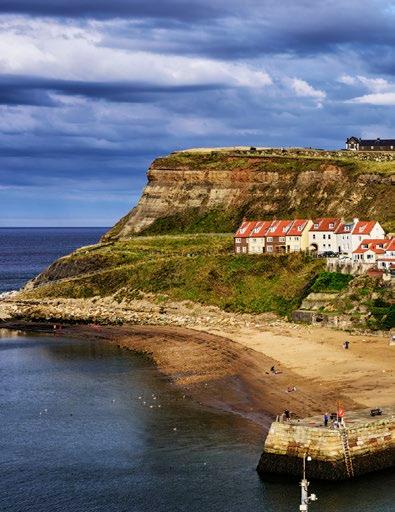

coffins to capes and pointed teeth. Each Halloween, the Abbey is bathed in splendid illuminations and the costumed characters tell tales of grave robbing and witch trials; not for the faint-hearted.
We followed Dracula’s footsteps into the darkness of St Mary’s Churchyard, where he was described

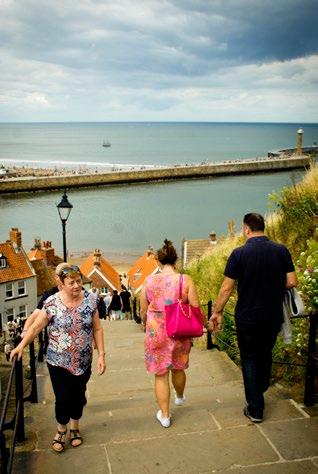

as towering over the white shadowy figure of Lucy Westenra. The gothic splendour of this town is one of the main reasons tourists flock here, to relive the horror of the most famous vampire story ever written.
Of course, the food is another reason Whitby is worth a visit. We always head for the fish and chip shops—it’s impossible not to be tempted by the tantalising aroma of deep-fried fish and chips soaked in vinegar, which drifts continually along the harbour. If you don’t fancy fish, there are lots of other choices too, from Argentinian to Indian. No doubt, one is spoilt for choice.
Sometimes you can find everything you want right on your doorstep. And this is the ideal time to holiday in the UK, as COVID-19 has restricted travel to other parts of the world. We’ll be sure to visit Whitby again very soon. n
Tell us about your favourite holiday (send a photo too) and if we print it, we’ll pay £50. Email excerpts@readersdigest.co.uk
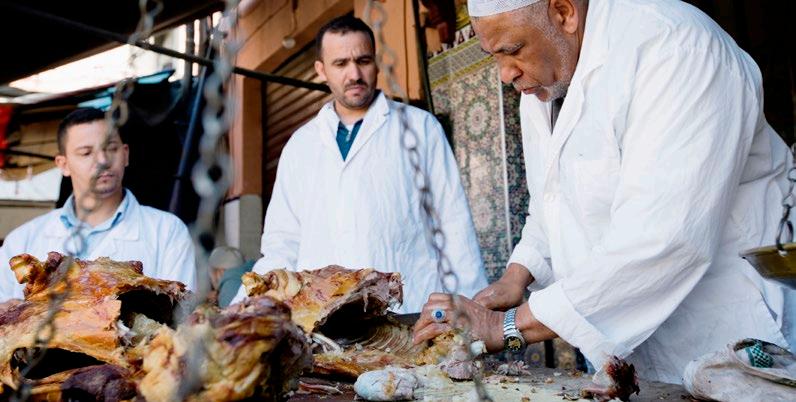
Mechoui Alley, Marrakech
Richard Mellor reveals the location of the most delicious—yet understated—eateries
in Marrakech
Want an intrinsic taste of Marrakech, separate from tourist confections and pricey hotel meals? Then point your palate towards “Mechoui Alley”. More boringly also called Derb Semmarine, it’s a small medina lane found behind the olive market just off main square Djemaa el-Fna.
Locate it and you’ll find three longstanding hole-in-the-wall restaurants. Each is of largely the same price (budget) and simple decor (nice tiles, carved plaster). Each is familyowned, and staffed by men in long white robes. And each serves the most delicious lamb you’ll ever taste.
There are three things on the menus, all sold having been weighed on oldfashioned scales. Usually reserved for celebrations, “ras” is roasted sheep’s head—look away now, squeamish
travellers—and affords a smoky taste. Cooked elsewhere overnight and biked over each dawn in terracotta urns, “tangia” is a lamb stew with garlic, saffron and preserved lemons. And then there’s the titular “mechoui” (pronounced “mesh-wee”): portions of whole sheep slow-roasted on wood fires inside clay pits beneath the houses on the alley.
The fragrant meat falls off the bone easily, and is effortlessly flavoursome. Even so, dip it in the small pile of salt and cumin provided with your serving for an even better taste. You’ll also receive some bread and, if desired, mint tea. There are some seats behind the counters, so you can sit, scoff and observe busy medina life.
The restaurants are busiest at lunchtime, from around 12-2pm, and closed during Ramadan, which begins in March or April for the next five years. n
HOW EQUITY RELEASE COULD HELP TO BOOST YOUR DISPOSABLE INCOME
More and more retired homeowners are looking to their property wealth in order to gain additional funds in later life, with some deciding to downsize - even though they would often rather stay in their current home. Downsizing can also be difficult: finding a suitable smaller home, paying stamp duty, and estate agents fees is a stressful process. As such, many retirees are searching for an alternative.
Luckily, downsizing is not the only option for those looking to turn their biggest asset into cash. One alternative to downsizing is equity release, which is a method of unlocking your property wealth by releasing tax-free cash secured against the value of your home. By releasing equity, over-55s can receive a cash lump sum without the need to move home.
With a lifetime mortgage (the UK’s most popular equity release tool) you retain 100pc home ownership and there are no required monthly repayments. Additionally, if you choose to release equity with Reader’s Digest Equity Release you will also benefit from several customer-focused safeguards that ensure you will never owe more than the value of your home and cannot pass lifetime mortgage debt on to your family and estate when you pass away.
It is important to understand the risks of releasing equity, including the effect releasing equity may have on your entitlement to means-tested benefits and on the value of your estate. Call today to speak with our friendly Information Team and find out if equity release could be the right option for you. n
Andy Webb on why you should be saving regardless of your financial situation
Low Interest Rates Don’t Mean You Shouldn’t Be Saving
With interest rates on high street savings accounts dropping to as low as 0.01% and many higher-paying accounts falling and falling over recent months, you might wonder if it’s a waste of time putting your money somewhere to earn a little extra. And it’s not a surprising attitude when you consider that pitiful rate would only make you a tenner if you saved a massive £100,000. Hardly worth it.

Andy Webb is a personal finance journalist and runs the award-winning money blog, Be Clever With Your Cash






Instead, you might feel your spare cash could go to better use elsewhere. Maybe extra money for your pension, or perhaps overpayments on your mortgage. Or you might turn to investments in search of bigger returns. Each of these, or indeed a combination, can be smart financial moves.
But to completely ignore the long-suffering savings account is a mistake—despite the poor rates we see pretty much across the board.
And 2020 has been the best example of why it’s vital we all have a stash available for the unexpected. The expensive emergency that none of us saw coming: COVID-19.
The sudden temporary closure
of many jobs through the furlough scheme, and the subsequent run of redundancies we’re still seeing has made a huge knock on millions of household’s finances. Those who had a rainy-day pot were better suited to ride the wave, and subsidise their lost income. Those without were forced to borrow enough to cover any shortfall.
Of course, even without the pandemic, costly emergencies can appear at the worst times. The roof could spring a leak, your oven could pack up, you just never know!
OK, so you might not be too worried about this. Maybe you feel you’ve got enough money to cover such costs. But are you asset rich and cash poor?
When your money is tied up in pensions or property, it’s not easy to gain access to it quickly (if at all). And we all know that investments are a long game—taking money out at the wrong time could cost you more than you made.
So you too might need to borrow to repair the roof or replace that appliance. And borrowing isn’t cheap. Overdrafts now tend to charge around 40% on any money in the red, while credit card rates are typically 19%. Yes, if your credit report is good you might be able to borrow at 0% for a year or two, but lenders are making it harder for people to access this kind of credit, so it’s a risk I’d say is best avoided.
That means if you can it’s vital to put some money in an easy-access account, or at least one where you can get money with a little notice. Watch out for any penalties that come with anything that is fixed. You might lose the interest you’ve earned or be restricted in how many
2020 HAS BEEN THE BEST EXAMPLE OF WHY IT’S VITAL WE ALL HAVE A STASH AVAILABLE FOR THE UNEXPECTED
withdrawals you can make in a year.
You don’t want to put too much in there. The rule of thumb tends to be enough to cover three to six months of expenses. You might feel in the current climate that you want to put a little more in—that’s down to you.
Don’t panic though, if that amount sounds like a fantasy. It’s better to put away what you can to at least have something saved up than have nothing at all. It’s also worth thinking about savings accounts for purchases on the horizon—from Christmas to new kitchens. Now more than any time in recent years it’s better for us to only buy what we can afford

and not think about how we’ll cover the cost later. So if you’ve got a big expense on the way, start putting extra cash aside for that too. These short term savings pots can be as vital as anything you’ve got for the longer term. If you don’t think you’ll use this additional stash for at least a year then you should consider longer fixes for this cash, guaranteeing the rate you’ll get.
Where to put your savings
Where you put it is another question. Traditionally savers have gone for Cash ISAs. The tax-free benefit means any interest you earn is all yours—the tax man doesn’t get any. But actually, most people are going
to be fine putting this money in a normal account. That’s because of the Personal Savings Allowance (PSA), where all basic rate taxpayers (so those earning less than £50,000 a year) can earn £1,000 of interest before tax is due. For higher rate payers, it falls to £500 a year.
But even that is a lot of money to earn when the interest rates are so low. At the time of writing, the NS&I Income Bond leads the pack with 1.16%. To even get close to £1,000 in a year you’d need to have £86,200 saved. And that’s far, far more than you’ll need to cover an emergency.
So in practice, you should just put that money in the best possible account you can—certainly not the
standard one your bank offers. There are in fact a few ways you can beat the NS&I rate—though these accounts are disappearing or cutting their rates all the time. They also have limits to how the balances that are eligible for interest. Still, they’re worth a look.
Current accounts with high(ish) rates include Nationwide’s FlexDirect (2% fixed for 12 months on £1,500), Virgin Money (2.02% on £1,000) and TSB’s Classic Plus (1.5% on £1,500).
Regular or monthly savers can also
get you a better rate—as much as 2.75% with HSBC, First Direct and M&S Bank. With each of these you also need a current account with the bank, and the monthly deposits are limited to around the £300 mark, hence the name “regular”.
Though, of course, by the time you’re reading this, rates could have fallen even further. If so, I’d still encourage you to move your emergency pot to wherever you will earn the highest interest. n
Don’t Stop Me Now
When it comes to sport, “age ain’t nothing but a number”…
In 1951 66-year-old Swede Gustaf Håkansson wasn’t permitted to enter a 1800km bicycle race due to his age. He showed up anyway and won the race by biking for several days without sleep. He earned himself the nickname ”Grandpa Steel”.
Lorna Johnstone was 70 when she competed in the 1972 Summer Olympics on behalf of Great Britain, in the Equestrian Dressage category. Though she never won a medal, Johnstone competed at three Olympics over her lifetime, and is the oldest British Olympic competitor of all time.
Gwyn Haslock, 73, who was Britain’s first competitive female surfing champion, can still be found riding the Cornish waves of her hometown. Speaking to The Guardian in 2019 she said surfing is, “like any sport, you’re always learning.”
In Harlem New York, one sprinter stands out from the rest—104-year-old Ida Keeling. She started running at 67 as a way out of her depression following the deaths of her two sons to drug-related violence in the 70s and 80s. Speaking to The Guardian she said, “I have no intention of slowing down. Age ain’t got nothing to do with it. When you really want to do something for yourself, go and do it. And if you fail, try, try, try again.”
Source: theguardian.com/global/2019/apr/07/age-is-no-barrier-meet-the-oldest-top-athletes

A TASTE OF HOME: YOTAM OTTOLENGHI
Super soft courgettes with harissa and lemon
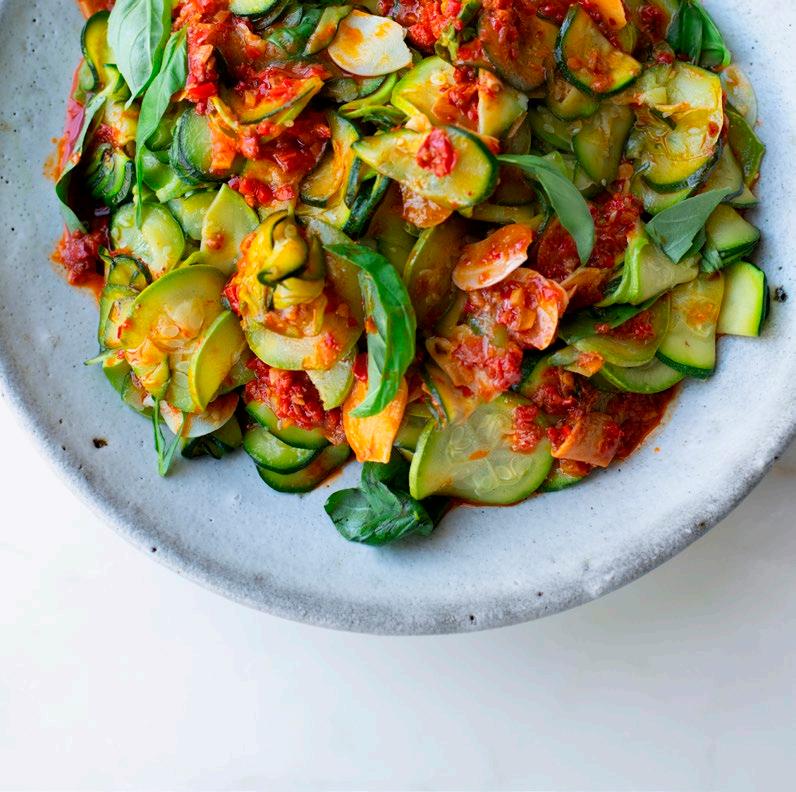
I’ve always liked courgettes. From childhood, it is my Italian grandmother’s fried courgette slices marinated in vinegar, and my mother’s slow-cooked courgettes in tomato sauce—her take on ratatouille—that left a lasting impact. More recently, during my own family trips to Greece in the summer, I have rediscovered courgettes, and particularly slow cooking them with
garlic. Sitting out on a terrace in the evening after a day in the sun, enjoying the breeze and the island’s crop at its absolute seasonal best is how I love my holidays in the sun.
This version has harissa and preserved lemons added but the principle remains the same: soft, creamy courgettes, seasoned gently with garlic and perfect served with anything, really.
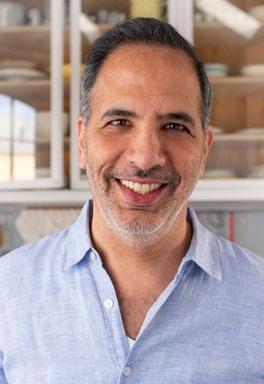
Ingredients:
Serves 4 as a side or mezze
• 85ml olive oil
• 6 garlic cloves, finely sliced
• 1tbsp rose harissa
• 1 red chilli, finely chopped
• ½ preserved lemon, finely chopped, discarding pips (10g)
• 1½tbsp lemon juice
• 1kg courgettes, finely sliced
• 10g basil leaves, roughly torn
• salt
Courgettes aren’t strictly speaking controversial, but they do tend to get a pretty lukewarm reaction from many. The reason for this is probably courgettes’ high water content, which tends to make them, well, watery. There are plenty of ways to combat this— frying and grilling are two examples—but we actually use it to our advantage here, cooking the courgettes slowly in their own juices, making them fantastically soft and enhancing their flavour by a long soak with fried garlic.
The courgettes are very good hot, but are even better after 15 minutes or so, or even at room temperature, once the flavours have had a chance to get to know each other. Make them a day in advance, if you want to get ahead; just hold off on adding the basil until you’re ready to serve.
1. Place a large, non-stick sauté pan on a mediumhigh heat with the oil and garlic. Gently fry for 4 minutes, stirring often, until soft, golden and aromatic. You don’t want the garlic to become at all browned or crispy, so turn the heat down if necessary. Remove 3 tablespoons of oil, along with half the garlic, and transfer to a small bowl with the harissa, chilli, preserved lemon and lemon juice. Stir together and set aside.
2. Return the pan to a high heat and add the courgettes and 1¼ teaspoons of salt. Cook for 18 minutes, stirring often, until the courgettes are very soft, but are still mostly holding their shape (you don’t want the courgettes to brown, so turn the heat down if necessary). Stir through half the basil and transfer to a platter. Spoon the harissa mixture over the courgettes.
3. Leave to sit for 15 minutes, then sprinkle with a pinch of salt and finish with the remaining basil. n
Recipe from Ottolenghi FLAVOUR by Yotam Ottolenghi & Ixta Belfrage (Ebury Press)
World Kitchen
Italy: Raw Shrimp Linguine
Chef Nicola Fanetti of Brace Copenhagen shares the recipe for the “subtly sweet and saline” fresh shrimp pasta


Fjord shrimp and saffron dashi:
• 500g Fjord Shrimp (300g for dashi, 200g for serving)
• 1L water
• 40g lime juice
• 0.7g saffron
• 150g seed oil
• Salt
• Soy sauce
• Extra virgin olive oil
• Zest of one lime
Peel 200g of shrimp for the finished dish and refrigerate, reserving the shells and heads. Place the reserved heads and shells, and remaining 300g of shrimp into a smoker and hot smoke with wood chips for 10 minutes. Then dehydrate for 5 hours at 60°C in the oven.
Put the dehydrated shrimp into a large pot with 1 litre of water and cook for 5 hours at a low temperature. Leave to infuse overnight in the fridge.
The next day fine-strain the obtained broth and add all the other ingredients to a blender. Blend at maximum speed for 2 minutes. Season carefully to taste with salt and a touch of soy sauce.
Place the peeled fjord shrimps in a 10% salt brine for 10 minutes.
Drain and dry, season with lime zest and extra virgin olive oil
Beurre blanc sauce:
• 250ml water
• 125g butter
• 26g vinegar reduction (white wine vinegar reduced by half)
Bring the water and the vinegar reduction to boil and reduce it by half ; remove it from the heat and add the butter stirring with a whisk until dissolved. Set aside.
For serving:
• 140g best quality dried linguine
• Santoreggia (savoury) leaves
• 150ml saffron dashi
• 2tbsp Beurre blanc sauce
• Prepared shrimp
Cook the fresh linguine until it is very al dente in salted water, (2 minutes before packet instructions) then add directly into 150ml of hot saffron dashi in a frying pan and finish cooking, mixing well with long tweezers or tongs
When the pasta is perfectly cooked, remove it from the heat and add about 2 tablespoons of Beurre blanc and finish creaming, you may need more. You may also need to add it back on the high heat here slightly to obtain a creamy sauce.
Serve the linguine in the centre of the plate, opening it slightly with a fork. Sauce the top of the pasta with the remaining saffron cream, add the raw fjord shrimps and decorate with the savoury leaves to finish.
How To Paint Tiles
For a stylish yet budget-savvy update, give dated or bland tiles a new lease of life with a fresh lick of paint
1
Before loading up your paintbrush, decide whether your existing tiles are suitable for painting. Most ceramic, porcelain, glass or stone tiles can be painted over, but as paint isn’t the most durable of coverings, this technique is best suited for areas where the tiled surface isn’t in a direct stream of water, such as a shower enclosure, and low-traffic areas when it comes to floor tiles.
2
To allow the paint to adhere properly to the surface of the tiles, begin by cleaning them thoroughly using sugar soap and a strong scourer. If you’re painting kitchen tiles, ensure that all grease residue is removed as this will show through your new paintwork.

Homes and gardens writer and stylist Cassie Pryce specialises in interior trends and discovering new season shopping
3
If your chosen tiles already have a matt finish, they probably won’t require any sanding; however, for high gloss surfaces, it’s advisable to use a fine-grade sandpaper to gently rub over each tile to help improve the grip for the paint when it’s applied. Don’t rub too vigorously, as this can make the surface uneven, and always remember to wipe away any dust after sanding.
4 Most specialist tile paints don’t require a primer, so you can simply apply your chosen paint directly to the surface using a small brush. It’s best to apply several thin coats of paint, rather than fewer thicker layers, as this will build up better coverage and reduce brush marks showing through. If you want to create a patterned effect rather than a simple block of colour, use a pre-made stencil on each tile to apply a more intricate design. n


Our Poisoned Air
If you live in a city, it’s no doubt an environmental woe you’ve heard of for years. But how much do people really notice it when it’s the least tangible component of the eco-struggle?
Arguably the most uncertain of all the ecological downfalls of our time, air pollution has largely gone under-reported by the media, yet despite its silent nature, it’s a killer. According to the Royal Colleges of Physicians and of Paediatrics and Child Health, air pollution contributions to 40,000 early deaths a year. The trouble is, it’s an indirect killer, which makes the issue hard to examine, and tackle— meaning the actual figure of deaths could be much higher, or much lower. As well as health implications and the carbon emissions that come with pumping out harmful chemicals, plants aren’t exempt from damage either; in the UK more than 90 per cent of vulnerable wildlife habitats had disproportionate nitrogen levels in 2014.
How then can we measure (and end) a problem this slippery? The answer is surprisingly simple. Diesel
is the largest emitter of NOx (nitric oxide (NO) and nitrogen dioxide (NO2)) and around 40 million people in the UK live in areas where diesel pollution is detrimental. Not only do we need to phase out the production of diesel vehicles as soon as possible, we also need scrappage schemes to replace all older polluting diesel models with eco-friendly alternatives, such as electric vehicles.
Apart from ammonia farming, pollution globally is actually decreasing—except for cities, where it’s on the rise. In London nearly 10,000 early deaths are caused each year by the capital’s toxic air, so creating clean air zones where high-polluting vehicles are banned would drastically decrease these harmful emissions. The problem with this method of reduction if not navigated carefully though is that it would disproportionately affect poorer drivers who can’t afford to upgrade. The poorer communities, and minority groups who are already facing unequal repercussions from air pollution can’t afford to be pushed further down the ladder when solutions come knocking. Increasing public transport could be the answer—by moving towards more greenery on rooftops, parks and city centres and pedestrianising, big cities could easily eliminate the problem. The answers are there, we just have to start.n
by Jessica Lone SummersExpert Q&A: Katie Nield
UK clean air lawyer at ClientEarth
How did you become an authority in the fight against air pollution?
As legal experts and environmental advocates, we identified a major issue in the UK ten years ago: the government was breaching EU air pollution limits, putting people’s health at risk. Where pollution is at illegal levels, the law requires ministers to act to urgently, but we realised that they were not taking this public health threat seriously. Since launching its first legal challenge on this issue in 2011, ClientEarth has defeated the government in court three times over its failure to tackle illegal levels of air pollution. In response to our challenges, courts have ordered ministers to come up with new, improved plans that set out measures to reduce pollution to within legal limits in the shortest possible time.
What are the biggest challenges we’re currently facing from pollution?
Air pollution has been linked to higher rates of cancer and heart disease. It can trigger heart attacks, asthma attacks and strokes, lead to low birth weights and stunt lung development in children. It also has a disproportionate impact on vulnerable communities such as those on low-incomes and ethnic minorities. We still have illegal and harmful levels of air pollution in far too many towns and cities across the UK including London,

Manchester, Leeds and Bristol. The latest figures show that 36 out of 43 zones used for reporting pollution levels still exceed legal limits for harmful nitrogen dioxide pollution—over ten years after those limits should have been met.
How does ClientEarth help our planet?
ClientEarth is a charity that uses the power of the law to protect people and planet. We work on developing laws that combat climate change, protect nature and our health. When those laws are broken, we go to court to enforce them. Since our creation in 2007, we’ve taken governments to court and secured multiple wins. Our legal action has stopped polluting coal power plants being built or expanded in Europe and stopped the Polish government logging Europe’s oldest forest, protecting this habitat and the wildlife that relies on it.
What changes need to happen to tackle pollution? The vast majority of illegal air pollution in the UK comes from exhausts. To clean up illegal air pollution in the UK, we need fewer and cleaner vehicles. That’s why the government urgently needs to put in place Clean Air Zones that restrict the most polluting vehicles from our towns and cities. n
Visit clientearth.org
Full Circle Fashion
Lisa Lennkh explores some of the fashion industry's more sustainable options
Autumn's cooler temperatures and beautiful colours never cease to excite me. I love reaching deep into my closet and rediscovering the soft cashmere and wool items that have served me well for many years. One of my favourites is this burnt orange lightweight, unlined wool coat from Hobbs. Every October, I decide it's time for it to

Lisa Lennkh is a banker turned fashion writer, stylist and blogger. Her blog, The Sequinist, focuses on sparkle and statement style for midlife women
make its yearly debut. The loose style allows for lots of layering, so I'm able to wear it now and throughout the colder winter weather. It was a carefully considered purchase, and one I've not regretted for a moment. I always find the more time and thought I put into my wardrobe investments, the better they pay off. I only wish I'd learned this lesson about not shopping impulsively a lot sooner than I did!
An item currently under consideration is this one that caught my eye last winter—a recycled cashmere poncho from Winser London. They source this from an Italian factory that takes previously worn or damaged cashmere items, bleaches out the colour, re-spins the yarns, dyes them again, and makes luxurious new knitwear. I've tried on this long poncho a few times, and a year later, I still love it. Its nearly Scandinavian level of modern simplicity really appeals to me. Also, the cashmere itself is superb quality. The versatility and elegance of a long poncho makes it even more irresistible. I'd use it as cosy layer for wearing around the house in winter. It would be ideal for a chilly office or aeroplane. It layers perfectly under a loose long coat like my orange one. I love how it modernises a jumper, or blouse, or even a sleeveless top (like Sisters Sledge in the photo). It feels like a wise investment for my wardrobe; supporting a business that


facilitates sustainable fashion feels like a wise direction of my money. "Circular fashion", where no longer used items are re-crafted into new clothes (like this poncho) is a new way of consuming that will be with us forever. It switches the make-wear-and-dispose cycle of fashion into a circular one, where every aspect of the process is geared to ensure tons of clothing do not end up in landfill each year. Some fibres, mostly the inexpensive manmade ones used by the fast fashion industry, simply do not recycle and do not decompose in landfill at the end of their usefulness. Not all synthetic fibres are wasteful— the clever hosiery brand Swedish

Stockings will take back your laddered tights and stockings to recycle them into brand new ones. In general though, circular fashion opts for wool, cotton, cashmere, hemp, and silk—all of which can be re-used or mixed with new natural fibres, without any compromise in quality. These materials are more expensive, but if they are used in several circular cycles of clothing in the future, they pollute and waste less of our natural resources. "Shopping my own closet", making only mindful purchases, and looking for ways to recycle my clothes makes me a better consumer. Innovative circular fashion brands will soon be giving us many more incredible options. n
Don’t Sweat It
Can you seamlessly swap the rollerball for the balm? Jenessa Williams puts tube deodorant to the test
What Are They?
For most of us, deodorant is an everyday essential—but it’s also an everyday strain on the environment. The compressed gases of an aerosol contribute to Co2 emissions, and rollerball designs are often highly reliant on an excess of plastic, and parabens in the formulas can interfere with our natural developmental hormones. Unsurprisingly, there has been a push towards a new kind of deodorant, and the balm is the latest—similar in application to a traditional hand cream or lip salve.
What Are The Supposed Benefits?
Boasting an array of botanicals to neutralise body odour, deoderant balms are normally free of the preservatives found in deodorant sticks, with less of a sticky feeling. Best of all, most cream-like deodorant balms absorb quickly, leaving you free of the streaky marks that plague dark clothing in the summertime.
Do They Actually Work?
Consider us converted! AKT London Orange Grove balm has impressed us the most, lasting all day with a pleasant, scent of mandarin and neroli that feels luxurious in it’s recyclable packaging. A slightly gritty texture feels odd on your fingers at first, but once applied, it's subtly exfoliating and mattifying, soaking up any moisture in moments. Balms are also perfect for travel, as they won’t cause any problem in carry on luggage. With hardly any drawbacks, balm deodorants might well be considered the future. n
Hero Products



1. AKT London SC.0T EXT. ORANGE GROVE, £18 for 50ml (also available on subscription)
2. Aurelia Probiotic Skincare Botanical Cream Deodorant, £18 for 50g
3. L’Occitane Verbena Deodorant balm, £17.50 for 50g







£79.99
SAVE £30


49.99




TRIPLE-ACTION TECHNOLOGY
Switch it on, choose your setting, then sit back and relax for 2 minutes !
HOW DOES IT WORK?
The Low frequency pulse EMS electrostimulator technology is a process that cobats the causes of poor blood circultion. VITALEG emits electrical micro-pulses via the soles of the feet to activate the nerves and contract the muscles of the feet and calves. The muscles will then release and release the blood that has congested during the first movement. At regular intervals, the electrostimulation creates a pumping effect in the veins, as if you were walking, to reactivate the blood circulation in the various parts of your body. This will give you the sensations you would experience from a real vibrating massage to stimulate your feet, improve circulation and relieve tiredness.

Control unit has 6 programmes 10 strength levels 15 min. On/Off

Electro-stimulation technology
Made from a soft comfortable material covered with leather and that is very easy to clean. Vitaleg is very quiet and can be used when watching TV, reading, working or simply when relaxing.
What would you say to an acupuncture treatment at home?
If you still don’t believe that it’s possible or too expensive, here is THE solution that could bring a smile to your face at last: the VITALEG mat. Designed to detect intelligently the acupuncture points on the feet (all types and all sizes), this mat is perfect for pain-free stimulation of the acupressure points, toning the cells, firming the skin of the feet and legs, combatting premature ageing of the veins by improving blood circulation and detoxing the meridians. It is also great for reducing muscular tensions and pains. The VITALEG stimulates the muscles in your feet and calves using low frequency pulse technology (EPS / EMS). It is very simple to use, simply place your feet on it and the electrical pulses will stimulate the meridians and acupuncture points.
VITALEG provides immediate benefits:
■✔ REACTIVATES circulation
■✔ LIMITS water retention
■✔ REDUCES swelling of legs
■✔ SOOTHES pain and swelling
■✔ IDEAL after surgery or if you are convalescing
■✔ COMBATS varicose veins
■✔ PREVENTS cramps
■✔ STOPS pains

Well-suited for pensioners, those who are sedentary, ladies who often wear high heels, or hikers …
Clinically tested results

INNOVATION SANTÉ 2020





WHY IS IT EFFECTIVE?
The VITALEG is based on an acknowledged ancestral method. This physiotherapy for your feet allows you to benefit immediately from a relaxing massage, the stimulation of the acupuncture points, the releasing of tensions and a reduction in fatigue.
VITALEG acts on the main health points:
LEFT FOOT:
• Brain
• Digestive system
• Heart
• Arteries
• Colon
• Lungs
• Kidneys
• Liver
• Stomach
• Pancreas
• Bladder
• Adrenal glands
• Pituitary gland
• Eyes
• Spleen RIGHT FOOT:
• Ears
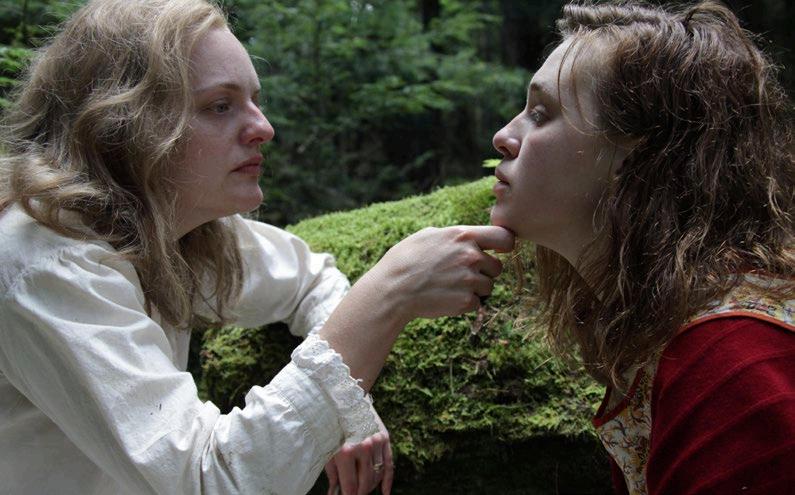
Elisabeth Moss and Michael Stuhlbarg stun and scare in this unpleasant yet utterly transfixing Shirley Jackson biopic
“
Thrillingly horrible” is the way someone describes Shirley Jackson’s work at one point in the film—and this sentiment just happens to perfectly fit Shirley itself. Shockingly vicious, disturbingly twisted and anxiety-inducing, this movie is certainly not for you if you’re looking for a romantic biopic about the poetry of being a writer.
In fact, the art of writing is barely the main event here; the film feels like an even more noxious remake of 1966’s Who’s Afraid of Virginia Woolf?, where an older couple plays with and teases a younger one for their own amusement. In Shirley, the older couple is the
eponymous horror writer Shirley Jackson (Elisabeth Moss) and her professor husband, Stanley (Michael Stuhlbarg). The younger couple are Stanley’s milquetoast protégé, Fred, and his compliant wife, Rosie, who move in with them, blissfully unaware of the diabolical mind games that await them.
The unnerving appeal of this movie, lies, of course, in the central couple as we watch them bicker, make up, and verbally assassinate each other in front of guests (“To our suffering, darling,” says Stanley, raising a glass. “There’s not enough Scotch in the world for that,” his wife fires back). Despite all the vitriol, the chemistry between Moss and Stuhlbarg builds with elegance and taste—even when they’re actively annihilating their own and other people’s relationships, they’re impossible to keep your eyes off.
Other Great Films About Writers 4

Adaptation (2002)
No other film depicts the anxiety, selfdoubt and procrastination that goes into being a creative writer. In Adaptation, Nicholas Cage portrays a lovelorn writer, Charlie, who’s suffering from a bad case of writer’s block, as well as his much more confident twin brother, Donald. Directed by the master of melancholy films, Spike Jonze, and written by the existentialist Charlie Kaufman, it’s a beautifully bittersweet work.

Barton Fink (1991)
Sometimes, writer’s block can take a turn for the terrifying, as this gem from the Coen Brothers demonstrates. In it, a neurotic New York playwright is invited to California to write for the movies only to discover that Hollywood is a hellish nightmare. Interestingly, the film was written as a cure for Coens’ own creative struggles, when the brothers got stuck writing Miller’s Crossing

Naked Lunch (1991)
In the “crazy” subgenre, we have David Cronenberg’s sci-fi classic, in which a fictionalised William S Burroughs kills his wife, mingles with giant insects and takes huge amounts of drugs—what’s not to like? Surprisingly, the wife-killing incident was not fictional—the real life William S Burroughs did indeed shoot his wife in the head in a “William Tell” stunt that went wrong.

Fear and Loathing in Las Vegas (1998)
In this ragtag cult favourite, a journalist (Johnny Depp) and his lawyer (Benicio Del Toro) embark on a drug-fuelled drive from LA to Las Vegas. The central character was inspired by the notorious gonzo journalist, Hunter S Thompson who himself had a penchant for drugs, alcohol, violence and insanity.
by Eva MackevicIn the fake news era, more of us than ever are turning to documentaries. But how heavy do you want your facts? Anyone wowed by Netflix’s Tiger King earlier this year—what I term escapist documentary, presenting characters and stories so outlandish they might as well be science fiction—should hasten to McMillions (NOW TV), detailing an attempt to rig the McDonald’s Monopoly game in the 1990s. Showrunners James Lee Hernandez and Brian Lazarte hit the jackpot with this story, involving a conspiracy of larger-than-life players; they reshape it into a twisty parable of American greed.
world seems too complicated, with individual episodes tackling Trump family business deals, the crisis in US care homes, and—for light relief—a maple syrup heist over in Canada. One of its producers is Alex Gibney, cinema’s busiest and most reliable documentarian; like his big-screen output, it’s smart, provocative viewing.
Retro Pick:
Those seeking journalistic rigour— something more broadsheet than tabloid—might prefer to investigate Dirty Money (Netflix). I’ve flagged this magazine show in these pages before: its two seasons are well worth dipping into whenever the TheCivilWar (Amazon Prime)

For many decades, the admirably curious filmmaker Errol Morris has ploughed his own furrow somewhere between these two approaches. Morris has just uploaded his 2000 series First Person to YouTube, and it remains as astonishing as it was on transmission. Morris has no-fuss, face-to-face chats with an extraordinary range of interviewees: women who fell for killers, giant squid fetishists, embittered gameshow contestants, tormented aviation heroes. Only 11 episodes were made, but all human life really does seem to be represented.
by Mick McCahillKen Burns’ 1990 overview of the formative US conflict—dwelling with scholarly love on sepia photographs and soldiers’ letters home—has defected from Netflix to Prime this year, but remains an appropriately stately, often very moving watch.

“

Album of the Month: THE DIGGING DEEP ANTHOLOGY
by Robert PlantGreatest voice in rock”, “Greatest metal vocalist of all time”, “Greatest of all lead singers”—there’s not an accolade that the rock legend Robert Plant hasn’t earned with his seminal vocals. Since his departure from Led Zeppelin, he’s built a remarkable reputation for himself as a solo artist, and established a number of bands such as The Honeydrippers and Band of Joy.
This extensive, two-album anthology traces his post-Zeppelin career, cherry picking some of the most beautiful and memorable tracks. The collection offers a rich array of musical influences and styles, as well as a comprehensive portrait of a much more mature, pensive and romantic Plant, far removed from his wild days as a bare chested sex machine of a frontman.
“Nothing Takes Place of You” features his gentle whispers wrapped in soft synths, while the lyrical “Ship of Fools” charms you with his soft tremulous vocals alongside some beautiful guitar picking. Nothing quite beats the mournful “Darkness Darkness”, though, that feels like a warm blanket on a dark night of the soul.
A Friendly Hand
On his podcast Digging Deep, Robert Plant revealed how lost and insecure he felt as an artist when Led Zeppelin disbanded. He credits the drummer of Genesis, Phil Collins, for putting him on the right path and helping him figure out how to work in the studio again.
“It was the first time ever I’d been away from the creche of Zeppelin; I really didn’t realise just how much patience and concentration you really need in a studio to get people to perform, give you something really, really important,” he revealed. Collins agreed to play the drums on Plant’s first solo album, and joined him on tour, offering his guidance and expertise, saying “John Bonham was probably the most important influence in my life. I’ll sit on that stool for you.”

October Fiction
Wider tragedies affect the everyday lives of the heroes of these novels in unexpected and nuanced ways…
Trio by William Boyd (Viking, £18.99)
Over his long career, William Boyd has written comic novels, thrillers, thoughtful character studies and fiction that ponders the 20th century’s great turning points. Now, with Trio, he combines all the above into a feast of storytelling crammed with delicious plots and subplots.

The setting is Brighton, 1968, where Talbot Kydd is producing a film starring the beautiful actress Anny Viklund. Completing the central trio is the director’s wife Elfrida Wing, once a successful author but these days boozing full-time. A screenwriter himself, Boyd makes very funny use of his insider knowledge of the many pitfalls involved in film-making. But we also follow the main characters, and several more, as

James Walton is a book reviewer and broadcaster, and has written and presented 17 series of the BBC
Radio 4 literary quiz
The Write Stuff
they navigate a rapidly changing wider world. The cataclysmic political upheavals of 1968—Vietnam, the Paris uprising, Martin Luther King’s assassination— take place off-stage. Yet the social transformations they represent affect everybody. For most writers, all this might well be more than they could chew. Like the old pro he is, Boyd handles it with total aplomb, somehow keeping the pace both brisk and unhurried, as he heads towards a conclusion that binds the various threads together in a wholly satisfying way.
Home Stretch by Graham Norton (Coronet, £20)
Graham Norton has been building a reputation not as celebrity author, but as a proper novelist in his own right. Home Stretch will surely boost it further.
Connor is a teenager in the smalltown Ireland of the 1980s when the car he’s driving crashes, killing three passengers, among them a young couple due to be married the next day. Blamed for their deaths, Connor is forced to leave
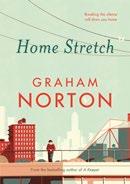
home. As the decades pass, and he moves to London and New York, his exile seems to be becoming permanent—not least because he’s gay, and afraid that his parents would never accept it.
Norton could presumably draw on his own experiences in making Connor’s painfully mixed feelings so convincing. But the novel proves equally assured in tackling plenty more besides, including his sister’s unhappy marriage and the continuing grief of the car-crash victims’ families. Meanwhile, Irish attitudes to homosexuality are changing—so might Connor be able to return? Occasionally perhaps, some of the characters’ behaviour feels a bit too shaped by the needs of the nicely twisting plot. Nonetheless, this is an accomplished novel—as well as an ultimately warmhearted and touching one.
Name the author
Can you guess the writer from these clues (the fewer you need the better)?
1. The first of her many bestselling novels shares its name with a large edible fruit.
2. She was born in Limerick, Ireland in 1963.
3. Her later novels include Lucy Sullivan is Getting Married, This Charming Man and Grown Ups
Answer on p126
PAPERBACKS
ACheesemonger’sHistoryof theBritishIslesby Ned Palmer (Profile, £9.99). A delightful and strangely heartfelt guide to British cheesemaking through the centuries. Who knew coagulated milk could be so fascinating?
Postscriptby Cecelia Ahern (HarperCollins, £8.99). Ahern’s sequel to the hugely popular PSI LoveYouis by turns romantic, funny and tear-jerking.
PrinceAlbertby A N Wilson (Atlantic, £10.99). Richly enjoyable biography that makes a strong case for Queen Victoria’s husband as a prime mover in the transformation of Britain into a global power.
TheSplitby Sharon Bolton (Trapeze, £8.99). A woman is on the run from her ex-husband in this tense, twisting thriller—and even moving to the remote island of South Georgia doesn’t mean she’s safe…
Meby Elton John (Pan, £9.99). Elton certainly doesn’t hold back in an autobiography packed with personal anecdotes—not all of them for the faint-hearted.
READER’S DIGEST RECOMMENDED READ:
Captain Marvel
Captain Tom Moore recounts the astounding life that led him to national treasure status


As you’d expect, Tomorrow Will Be a Good Day begins and ends with the astonishing events of earlier this year, that saw its author elevated to official National Treasure status. In early April, recovering from a hip operation, Captain Tom Moore decided to attempt 100 sponsored laps of his family’s driveway before his 100th birthday on April 30. The hope was to raise £1,000 for the NHS. In the event, he raised
£38.9 million—and his birthday was celebrated with a billboard in Piccadilly Circus, a fly-past by a Spitfire and a Hurricane and personal messages from the Prime Minister, the Queen and the UN SecretaryGeneral. A couple of months later, he was knighted at Windsor Castle.
The book beautifully captures Captain Tom’s mixture of amazement and pride at what happened in 2020. But it’s just as lively and entertaining about the rest of a life that began when Lloyd George was PM. A product of the post-First World War baby boom, Tom grew up in Keighley, West Yorkshire. The family was comparatively well-off—he keenly remembers the excitement of getting a car in 1925—although the fact that his father was deaf still seems a source of sadness. In 1940, he was called up and sent to India to fight the Japanese: an experience he again describes with great vividness and that clearly remained central to him. (After the
war, he organised his battalion’s annual reunion for 64 years, until he was the only one left.)
The book leaves us in no doubt, either, about Tom’s keenness for the ladies, several of whom he recalls fondly. He was also married twice. His first marriage, which he writes about with raw honesty, was increasingly miserable; his second, to Pamela, much happier. When she died in 2006 (see sidebar), he moved in with his daughter Hannah’s family, but continued to travel abroad—including back to India— until his late nineties, before “a silly fall” led first to immobility and then to worldwide fame.
It also turns out that, back in 1943, he’d met someone else who brought hope in a time of national crisis:
With our orders changing frequently, I found myself in a tented camp with 40 or so men deep in the jungle about three miles from Chittagong. It was a spartan place with very few creature comforts but, for a while, it was home. One sticky afternoon, a charming young Englishwoman appeared in our midst out of nowhere, like some sort of vision. All smiles, she pushed her way through the bush on foot, and was quite a sight to see. Everyone snapped to attention immediately and hurried over to say hello to the first British woman we’d seen in months. We also wanted to find ‘‘
out what on earth she was doing there. We quickly learned that she was part of the Entertainments National Service Association (ENSA) whose job it was to raise the spirits of service personnel. Their random concerts and camp sing-alongs were something we were growing accustomed to, and we’d already been visited in previous camps by the comedic singer Stainless Stephen from Sheffield (wearing a waistcoat made of Sheffield steel), as well as the British comedy duo and BBC radio stars Elsie and Doris Waters.
But the appearance of this young lady who was about the same age as me was very different—not least because Lord Louis Mountbatten was accompanying her. Their arrival attracted a great deal of attention, but several of us still didn’t have a clue who she was. ‘It’s Vera Lynn!’ someone said. ‘You know, the one who sings “We’ll Meet Again”’. Although I was familiar with the tune, which came out soon after war was declared, I’d never registered the singer’s name before or knew that
Tomorrow Will Be
A Good Day by Captain Sir Tom Moore is published by Michael Joseph at £20

the Daily Express had dubbed her the ‘Forces Sweetheart’.
Not that it mattered. We were all just happy to see her, whoever she was. Miss Lynn chatted sweetly to the men and offered to sign anything from shirts to hats. She then sang us a little song or two, completely unaccompanied, including ‘We’ll Meet Again’, which resounded magically through that sorry little excuse for a camp and raised our spirits enormously. This blondehaired, blue-eyed angel from back home helped us feel that we weren’t so far from those we loved. I will never forget what she did or the fact that she wasn’t at all precious about being there. I had to admire her for that. Mountbatten was pleasant enough and I noted that there were a few other top brass accompanying Miss Lynn—lucky devils. I can remember thinking to myself, You see, Tom—only the top people get the top jobs. ’’
And the name of the author is…
Marian Keyes, whose first novel was Watermelon. Since then her books have sold more than 35 million copies and been translated into 36 languages. She’s also won two Irish Book Awards.


Captain Tom’s farewell to his wife
“To watch someone you love decline through dementia is a kind of slow torture. You lose them before you lose them and that is what happened with my darling Pamela. One day, as I arrived with a bunch of her favourite freesias, she looked up, smiled and said, ‘If you didn’t come every day, Tom, I would be so lonely.’ That really hit me hard as I knew what it felt like to be on your own, but I could only imagine how much worse it must be in a care home. I was painfully aware that there were many other old people there who had nobody to visit them at all—not a soul, year after year… There were about 25 of us at her funeral and [my daughters] Lucy and Hannah read something lovely together. I couldn’t bring myself to speak, but I asked the undertakers to play, ‘We’ll Meet Again’ by Dame Vera Lynn, because I wanted to think that—one day—we might.”
Books THAT CHANGED MY LIFE
Journalist, podcaster and novelist Elizabeth Day has sold 33 million books worldwide. Failosophy is published by HarperCollins (£10)

The Tiger That Came to Tea by Judith Kerr
It was my favourite book as a young child. I got to meet Judith Kerr many years later and she was such an absolute delight as a woman and as an author. I think this was the book that made me fall in love with reading. I love the way that she takes something so mundane and normal, like having tea every day with your family, and injects this incredibly surreal but lovely moment. It makes you believe that anything is possible and it really appealed to the wildness of my imagination. There’s one point in the book where the tiger drinks all the water that comes out of the tap. Little things like that, made me giggle as a child. The Tiger Who Came to Tea was one of those stories.

The Neapolitan Quartet
by Elena FerranteFerrante is an astonishing writer who takes something that is historically overlooked in great literature—a lifelong female friendship—and analyses it with beauty and realness through really difficult times. Like any lifelong love affair it has its ups and downs. But the way that she analyses it and the credit that she gives it, and the way that she intersperses it with what’s happening politically in Naples from the 1950s onwards, it’s like a work of 19th-century great literature. It showed the characters grow into two realised women over 50 years. It made me see that that was possible and I could do that on my own.
Eat, Pray, Love
by Elizabeth Gilbert

I came to Elizabeth Gilbert with a heap of prejudiced assumptions about how she was just going to be writing selfhelp—which wasn’t for me. And then I read Eat, Pray Love at a time when my marriage was breaking down and I’d had infertility issues. I remember so vividly reading the first few sections of that book and feeling so seen and understood. It was like she’d crawled into my head and was putting on the page experiences that I was going through. It really made me feel less alone at such an integral and important time in my life and I’m forever grateful for that.
Can Big Tech Be Contained?
James O'Malley warns of the dangers of tech's "Big Four"
From the moment Alexa wakes us up in the morning, through to Google recording our every search query, to Facebook feeding us a diet of what our friends are up to, our lives are increasingly in the hands of just four companies: Google, Facebook, Amazon and Apple. Every day, they get to decide what we see, hear and experience in a way that no other companies in history have before.
For example, on the average Facebook feed, there are reportedly up to 1500 things that Facebook could show us at any one time: Baby photos posted by your cousin, news articles, your friends arguing about politics and so on. So to make this manageable, Facebook uses an algorithm to choose what it thinks we most want to see.
YouTube, which is owned by
Google, works in a similar way. Of the tens of millions of videos it could show us, it instead uses an algorithm to pick a selection of videos it guesses we might like instead.
In both cases, we don’t know in any detail how these algorithms work. In fact we can’t know, as these are the "secret sauce" that have made the two platforms so successful, and so addictive. If they were to tell us their algorithmic secrets, it’d be like CocaCola opening its vault and sharing its secret recipe with the world.
This is… a little unsettling. We’re bombarded with digital content 24/7 and these four enormous corporations get to play gatekeeper. This is why in recent years the tide has turned on “Big Tech”—and many people are starting to ask, "have these companies have become too powerful, and should we do something about it?"
Big Tech, Big Problems
One particularly scary example of the raw power of Facebook took place in 2010. On election day in the US, the company added a feature that allowed some users to click an “I voted” button. If they clicked, it would display to their friends that they had cast a vote, and would show you how many friends also said they had voted. According to the research, this one little nudge drove up voter turnout, and resulted in an extra 340,000 votes being cast. By making a tiny tweak to what it shows, Facebook made a big impact on an election.
Arguably this is a benign example. But it's easy to imagine how such power could be used and abused. If Facebook can prod us to behave in particularly ways, that’s an enormous amount of power in the hands of CEO Mark Zuckerberg. And this isn’t just true for politics. What we see shapes all of our behaviour, whether it's holding certain opinions or buying specific products.
For example, Apple as the overseer of the App Store found on iPhones has been accused of using its store policies to restrict competitors from making certain apps. And Amazon has been accused of using its market power to drive smaller competitors out of business. This means that when it comes to choosing which apps to use or what products to purchase, we are at the mercy of Apple and Amazon.
Breaking Up With Big Tech?
Okay, so these four companies are powerful now. So what? Inevitably in the cut throat world of business, it's only a matter of time until another company invents a better product, and shakes up the tech industry again, right?
Not necessarily. What makes these four companies slightly different to what has come before them, even when compared to enormous oil companies or banks, is that the tech firms are able to leverage the power of “network” effects, which entrenches their position.
Facebook is once again a particularly good example of this. What makes Facebook useful is that all of your friends are there. If another company created something better than Facebook, it would be hard for it to gain a foothold because, ultimately, everyone you know is already on Facebook.
What makes these companies powerful is that the more data they have, the more power they obtain… and the more power they have, the more data they can obtain, making it extraordinarily difficult for new competitors to emerge and the harder for us to look away. And that gives them an unprecedented amount of power to shape how we understand the world.
Sadly, there are no easy ways to make Big Tech less, well, big. n
You Couldn’t Make It Up
Win £30 for your true, funny stories!
Go to readersdigest.co.uk/contact-us or facebook.com/readersdigestuk

I was travelling by train in a crowded carriage with my nephew and his three-year-old daughter. Looking out of the window I excitedly exclaimed, "Oh, look, moo cows!" Trouble is, I’d forgotten that my companions had gotten off at the last stop!
LIZ TUBBY, NorfolkAfter a caving trip in the Yorkshire Dales, one of my friends gave us a lesson on the local sheep. He explained about their tails; the sheep were renowned for their fat tails so if trapped in snow in the winter they
could survive off the energy in them. At the end of the lesson my other friend said, “So does that mean that if you’ve got one of these sheep trapped in the winter between Carlisle and York the story would be “A Tail of Two Cities?”
SONIA MACKENZIE, CheshireI'd been having some back pain so I went to see my GP. After a few tests it was confirmed that I'd got one leg shorter than the other. I was telling my elderly neighbour, Tom. He said, "I’ve got that only I have one longer than the other." I didn't want to say anything as it's the same thing, bless him.
JANE WHITAKER, KentDuring a trip to the seaside by train, my three-year-old daughter and I found ourselves sitting opposite an elderly gentleman.
“Would it be all right if I offered your daughter a boiled sweet?” he kindly asked.
“That’s very nice of you,” I said.
My daughter took the sweet and said, “Thank you.”
I smiled and felt so proud that she didn’t need prompting; I’d brought
ESTHER CHILTON, Berks
her up to know her manners. She popped the sweet in her mouth, her expression swiftly taking on a look of disgust, before yanking it out her mouth and throwing it back at the gentleman. I think the look of horror on the gentleman’s face was reflected in my own…
I met my elderly masked neighbour and we started to chat as we kept social distance. We agreed how challenging recent times had been, until my neighbour surprisingly said she enjoyed wearing her face protection. "It disguises the fact that I don’t have my uncomfortable dentures in!" she announced happily.
JILL COHEN, YorkshireMy son pointed to a big bluebottle on the table. "I killed that" he said as he tucked into his sausage and mash.
"Ugh," I said and proceeded to get the hand-sanitiser out, furiously trying to get rid of any germs.
"You were clever though, killing it with your hand" I remarked.
"No mum" he retorted "I killed it with my sausage."
DEMI ROBERTS, WalesI was just about to take a picture of my two-year-old granddaughter when she pushed my phone away with her hand and shouted, “No more cheese,” then carried on playing. I tried again and she reacted in the same way.
I asked her mum why she was saying “no more cheese” every time I went to take a picture. She told me, “because we tell her to say cheese when we take a photo. No more cheese means don’t take any photos”. So cute! INDIRA
MAHUN, via emailAs a semi-retired primary teacher, I like to tell my much younger colleagues jokes to cheer them up. They have various degrees of success. "When I was 16, I knew the usherette at the cinema liked me, because she always took a shine to me," fell flat. I tried to explain to a 22-year-old teacher that usherettes used to show you to your seat by a torch.
She shrugged in disbelief and said, "Why didn't they just turn the lights on?" For once in my life, I had no answer!
KEITH LODGE, HullWhen my friend's husband drove us both to our weekly slimming club meetings, he would always have to wait patiently on yellow lines while she removed heavy items of clothing—all in a bid to shave off an extra few ounces before the dreaded weigh-in.
One week, as she struggled with the zip on her overcoat, her husband finally reached the end of his tether.
“Why don't you just remove your dentures?” he growled, then added: “You could be Slimmer of the Month!” Ouch!
ANN BENNETT, Stoke-on-Trent






Each must-read monthly issue
YES I want to subscribe to Reader’s Digest Magazine for just £3 for 3 issues (a saving of £8.37 on the shop price of £11.37 based on the cover price of £3.79 per issue). I understand that if I do not wish to continue receiving Reader’s Digest after my first 3 issues I can simply cancel my subscription by contacting customer services. If I do want to continue to subscribe after my first 3 issues I need do nothing and my subscription will automatically be renewed at the low rate of £7.50 for every 3 issues until I decide otherwise.

IT PAYS TO INCREASE YOUR
Word Power
In honour of October, we devote this month’s quiz to seven-letter words that begin with O. Will the answers be obvious or will the test prove onerous? That depends on you. Onward!
1. oblique
A: docile.
B: indirect.
C: regretful.
2. occlude
A: ignore.
B: westernise.
C: block off.
3. ominous
A: dire.
B: rocky.
C: bejewelled.
4. outcrop
A: overharvesting.
B: jutting bedrock.
C: mullet-like haircut.
5. oddment
A: remnant.
B: portion of fallow land.
C: left half of a racket court.
BY ROB LUTES6. orectic pertaining to:
A: speech.
B: gold.
C: desire.
7. organza
A: citrus fruit.
B: a large wooden stage.
C: transparent fabric.
8. obviate
A: explain.
B: prevent.
C: nurture.
9. obloquy
A: abusive language.
B: religious offering.
C: sad musical piece.
10. odyssey
A: long journey.
B: idiosyncrasy.
C: feeling of discomfort.
11. opulent
A: optimistic.
B: ostentatiously wealthy.
C: carefully organised.
12. occiput
A: crest of a wave.
B: back of the head.
C: spout.
13. orotund
A: grossly overweight.
B: glowing.
C: full- and richsounding.
14. osseous containing:
A: bone.
B: acid.
C: air.
15. ocarina
A: teardropshaped flute.
B: small squash.
C: spicy soup.
ANSWERS
1. oblique—[B] indirect. Yeva made oblique references to her sister’s surgery but stopped short of asking how it had gone.
2. occlude—[C] block off. We had the blinds custom-made to better occlude the morning light, but it hasn’t improved the situation.
3. ominous—[A] dire. Evidence of the Asian carp swimming in the upper Mississippi River is an ominous sign of how far the invasive species has spread in the US.
4. outcrop—[B] jutting bedrock. If you’re going on that hike tomorrow, be sure to visit the outcrop of quartz that marks the summit.
5. oddment—[A] remnant. His dishevelled uncle shuffled into the kitchen, dressed in oddments of clothing.
6. orectic—[C] pertaining to desire. The new iPhone has left me in a deeply orectic state.
7. organza—[C] transparent fabric. Paula charmed the assembled guests with her elaborate floral dress set off by an organza sash.
8. obviate—[B] prevent. The new drains were installed to obviate water damage to the museum.
9. obloquy—[A] abusive language. The video footage of the mayor’s misdeeds brought him a storm of obloquy.
10. odyssey—[A] long journey. Myra’s odyssey took her from a tiny town in Yorkshire to the stages of the West End.
11. opulent—[B] ostentatiously wealthy. The furnishings in Professor Clark’s home were even more opulent than Sadia had expected.
12. occiput—[B] back of the head. The massage therapist ran her fingers along Jermaine's occiput in an effort to alleviate his headache.
13. orotund—[C] full- and richsounding. Everyone was awestruck as Juliano’s orotund baritone filled the hall.
14. osseous—[A] containing bone. The soil in the Egyptian cave was rich in osseous remains.
WORD OF THE DAY*
PANEGYRIC
An elaborate and poetic compliment
Alternative suggestions: "When your frying pan spins when in use."
15. ocarina—[A] teardrop-shaped flute. The ocarina produces a very sweet sound— neither too high nor too low.
VOCABULARY RATINGS
7–10: fair
11–12: good
13–15: excellent
READER OFFER
15% OFF HEALTH SUPPLEMENTS FOR ALL OUR READERS
SUPPORTING THE 50+
GET MORE GREENS IN YOUR DIET
If you need an easy and convenient way to get more greens in your diet, why not try Prime Fifty’s new e ervescent super greens tablet which is the first of it’s kind available in the UK. It’s received great reviews for its well-researched ingredients list, ease of use and superior taste – with a melon and lime flavour which makes it an altogether tasty and refreshing drink that you can take daily. £23.00 for a 1-month supply.


SKIN, HAIR & NAILS SUPPLEMENT
TAILORED TO THE 50+
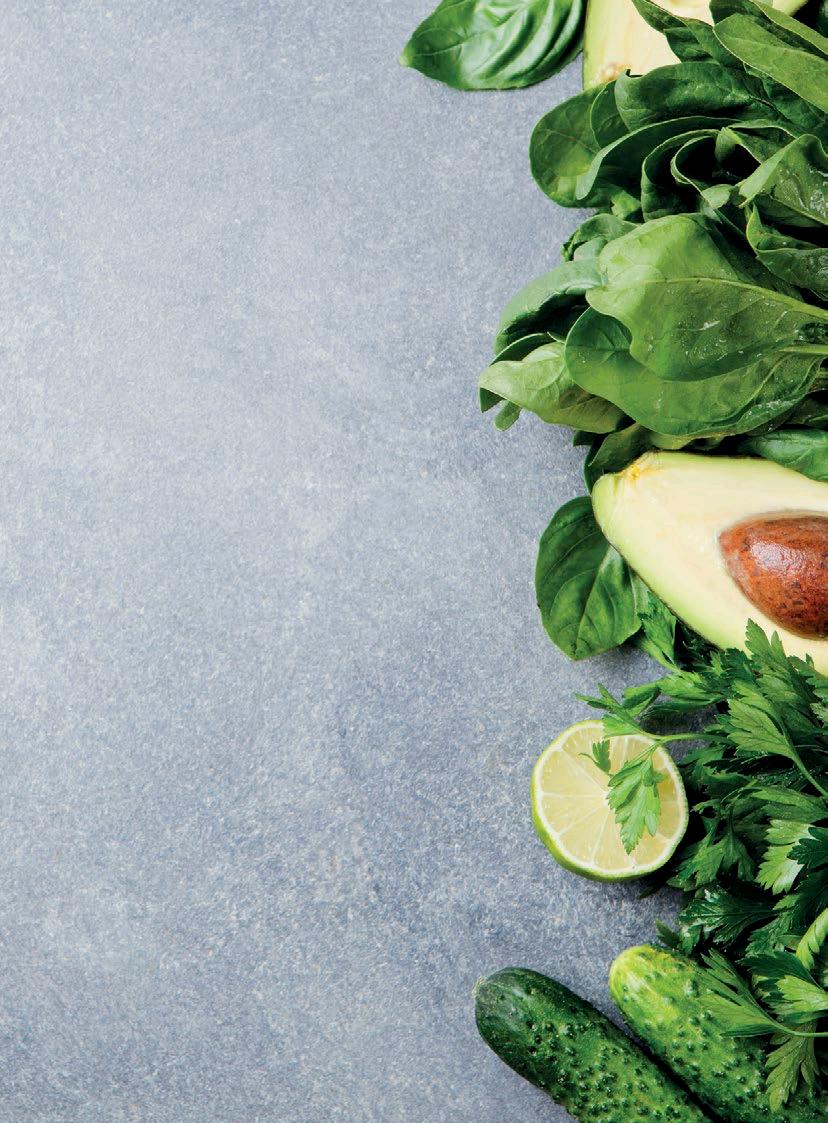
RECEIVE 15% OFF YOUR FIRST ORDER
USING CODE DIGEST15









Designed to nourish and protect your skin, hair & nails from within - these “Beauty from Inner Health” supplements have been exclusively formulated by Prime Fifty to meet the unique needs of the over 50s. Created to supplement your diet using an age-specific multi-nutrient formulation, comprising the most essential vitamins, minerals and natural extracts to help you feel good in the skin you’re in. £65.00 for a 3-month supply.





Brainteasers
Challenge yourself by solving these puzzles, then check your answers on p139
Lift Shuffle
Efficiency is our watchword at Best Fit Movers! Your job is to slide all eight items coming off the truck (in the order indicated) into this lift through the open door so that it all fits. The lift and the items are shown from above. You may rotate the items, but they must remain right-side-up: you can’t flip them so that a different side is touching the ground. For efficiency’s sake, once an item is placed, you may not move it again. Everything must slide into place without the need for lifting, so a move like the one shown isn’t possible. There will be one unfilled square left in the lift when you’re finished. The first item has been placed for you. Can you finish the job?
Beeting Time
You have two beetles and a log. One beetle can walk the length of the log in two minutes and the other in six minutes. With this, you need to make a five-minute timer. The beetles will always walk at full speed in the direction in which you set them. Assume you cannot measure the log or use anything else except the beetles to accomplish this task. How can you do it?
Block Interlock
Divide this rectangle along the lines into two identically shaped 12-block pieces that each contain the letters from A through L. The identical shapes don’t need to share the same orientation.
Criss-Cross Math
Place the digits from 1 through 9 into the nine empty cells so that each of the three rows and three columns form correct equations. Use all nine digits without repeating any of them. All calculations involve only positive whole numbers and should be performed from left to right or top to bottom, ignoring the mathematical order of operations (PEMDAS).
The Wheel of Profit
The Wheel of Profit offers far more favourable odds than anything you’ll find in a casino. Each player must wager £10 per spin. If the wheel spins to the colour you bet upon, you receive an amount of money equal to your £10 multiplied by the number shown.
Otherwise, you lose your £10. For each spin, Kai bets on blue while Kiran bets on red. Which person is likely to have made a bigger profit after six spins?
There are several ways to accomplish this. Here's one of them: Place one beetle at each end of the log and let them go. When they meet, turn either beetle around. When it reaches its starting point again, start the faster beetle at one end of the log. Five minutes will have elapsed when it reaches the other end.
Block Interlock
Criss-Cross Math
The Wheel of Profit
Kiran, though this outcome isn’t guaranteed.
Replace a number in the central box by which all the other numbers can be divided without leaving a remainder.
The number is greater than 1.
Laugh!
WIN £30 for every reader’s joke we publish!
Go to readersdigest.co.uk/contact-us or facebook.com/readersdigestuk
Don’t you just hate rhetorical questions?
Seen on Reddit
How broke is Jackie Chan? All those impressive flips, and not once did change fall out of his pockets. Somebody pay the man!
Comedian STEVE MOI can still rememeber the last words of my grandfather. He said, “you selfish boy.” Not long after that, I became a fish monger.
Comedian MILTON JONESMy friend and I were out for a walk when we noticed a giant hole in the field. We walked up to the hole and
threw in a small rock—no sound, no sign of it hitting the bottom. So we found a larger rock and threw it into the hole. Again, there was no sound and no signs of it hitting the bottom.
My friend noticed a bunch of railway sleepers along the forest line nearby. We lugged the giant hunk of wood to the hole and threw it in. Again, there was no sound and no signs of that heavy thing ever hitting the bottom.
Then, out of nowhere, a goat came running toward us at full speed and jumped into the hole! We were so freaked out that we ran off to go and find help. A farmer pulled up in his pickup truck shortly after. We flagged
I bought myself some velcro shoes last weekend. WHAT A RIP OFF! Seen online
him down and asked if he was missing a goat. We told him how the goat had jumped into the hole
The farmer found the story puzzling and responded, “Well, it couldn’t have been my goat. My goat was tied up to a railway sleeper.”
Seen on Reddit
Which rock group features four men, but none of them sing?
Mount Rushmore.
Submittied via email
I was confused by a man in the street today yelling, “duck, duck!”
Whatever he was talking about went straight over my head.
Seen on Twitter
Fred came home from university in tears. “Mum,” he stuttered. “Am I adopted?”
“No of course not”, replied his mother. “Why on earth would you think such a thing?”

IT’S NOT JUST HUMANS WHO STRUGGLE WITH HEAT WAVES. THESE CATS HAVE GIVEN UP…
via sadanduseless.com


Fred showed her his genealogy DNA test results. No match for any of his relatives, and strong matches for a family who lived the other side of the city.
Perturbed, his mother called her husband. “Honey, Fred has done a DNA test, and… I don’t know how to say this… but he may not be our son.”
“Well, obviously!” he replied.
“What do you mean?”
“It was your idea in the first place,” her husband continued. “You remember, that first night in hospital when the baby did nothing but scream and cry and scream and cry. And you asked me to change him. I picked a good one I reckon. Ever so proud of Fred. Seen on Reddit
You know, somebody actually complimented me on my driving today. They left a little note on the windscreen, it said “Parking Fine.” So that was nice. Comedian TIM VINE
I went to buy a watch, and the man in the shop said “Analogue?”
I said “No, just a watch.’” Submitted via email
I can’t exercise for long periods. When I get back home from a run my girlfriend usually asks if I’ve forgotten something.
Comedian PETE OTWAYSurreal Summer
Twitter users sum up their strange summers spent during the COVID-19 lockdown using just six words…
@TaylorLynea: “Trash goes out more than me.”
@MelodyButler: “ ‘Best summer ever’ - My dog.”
@Vansha2017: “Let’s hang! Sending you the link…”
@CapnOMySoul: “Yes
Netlix. Still watching. Always watching.”
@Klean_Killer: “Tell us about outside again Daddy.”
@MelissaBuntcake: “Melissa, can you mute your mic?”
@SeaWolf510: “Can somebody please yell ‘Jumanji’ already?”
CROSSWORD ANSWERS
Across: 1 Odour, 4 Amsterdam, 10 Enthusiasm, 11 Nose, 12 Red alert, 13 Enmity, 14 Pineapples, 16 Some, 18 Ones, 20 Laboratory, 23 During, 25 Spaceman, 26 Jack, 27 Bridesmaid, 28 Retriever, 29 Usual
Down: 2 Dandelion, 3 Upheave, 5 Meant, 6 Tempers, 7 Renames, 8 Asset, 9 Asleep, 15 Lob, 17 Margarita, 19 Shirker, 20 Legible, 21 Reader, 22 Thermos, 24 Usage, 25 Suite


60 Second Stand-Up
We chat to the quickwitted comedian, Richard Herring
WHAT’S THE BEST PART ABOUT PERFORMING? Being able to carry on doing stuff online [during lockdown] is such a relief. I started doing a ventriliquisom act with an 128-yearold dummy that my great-grandad made and we review the newspapers. You start believing the puppet is real!
CAN YOU TELL US ABOUT A MEMORABLE HECKLE? I used to do a thing where I’d pick on somebody who looked young in the audience, like a 12-year-old and then invite them to say something to me. Whatever they said I’d pretend to be crushed by.
Once this boy said “the sleeves of your jacket are slightly frayed.” It was very funny and quite crushing.
WHAT INSPIRES YOUR COMEDY? I’ve always liked funny people. The stuff that got me into comedy initially when I was a teenager was Monty Python, I got sort of obsessed.
DO YOU FIND ANY PARTS OF THE UK TO BE FUNNIER THAN OTHERS? There are certainly places where you feel you have a better audience or that there’s a nice atmosphere. I always really love playing Bristol. I think it’s the audience—there’s something between the two of us.
IF YOU WERE A FLY ON THE WALL, WHOSE WALL WOULD IT BE ON?
I would like to be a fly on the wall of Prince Andrew currently, it would be quite interesting to see what he’s up to and see how his life is progressing at the moment...
WHAT’S YOUR PET PEEVE? Pick up your dog poo!
WHAT’S YOUR FAVOURITE ONE-LINER? The only joke I can ever remember is: What’s brown and taps at your window? A poo on stilts. n
You can watch Richard Herring on Taskmaster this month. His book The Problem with Men: When is it International Men’s Day? is out 5 Nov.
Beat the Cartoonist!

Think of a witty caption for this cartoon—the three best suggestions, along with the cartoonist’s original, will be posted on our website in mid-October. If your entry gets the most votes, you’ll win £50.
Submit to captions@readersdigest.co.uk by October 7. We’ll announce the winner in our October issue.
AUGUST’S WINNER

Our cartoonist hasn’t regained his crown this month as his caption, “Going anywhere nice on your holiday?” was beaten hands down by our reader Dorothy Godwin with, “I’m sorry but I can’t reach from here, can you come back when your hair is longer?” Congratulations Dorothy!

INTERIEW: CARLA BRUNI
We chat to the singersongwriter and former supermodel about her career and latest album
A CULTURE OF SHARING
Meet the Syrian refugees who have brought their home cuisine to British shores

Rest & Recover
Lizzie Enfield extolls the importance of taking time to convalesce after an illness
LAUGH
Confused about equity release? Get the facts.

Equity release has soared in popularity, yet many people still have questions over how the process actually works.
In our guide we explain how to boost your finances by releasing money tied up in your home. Packed with customer stories, facts and figures, why not find out if equity release could work for you?
Get your FREE copy of the Reader’s Digest Guide today.
0800 029
For your FREE GUIDE call us now on: or visit: www.readersdigest.co.uk/er2
1233
This is a Lifetime Mortgage which may impact the value of your estate and could affect your entitlement to means tested benefits. To understand the features and risks, ask for a personalised illustration. Reader’s Digest Equity Release is a trading style of Responsible Life Limited. Only if your case completes will Responsible Life Limited charge an advice fee, currently not exceeding £1,490.


